#i mean like the definition of liminal space which is something something transitional places
Text
I made a graph to describe how I feel
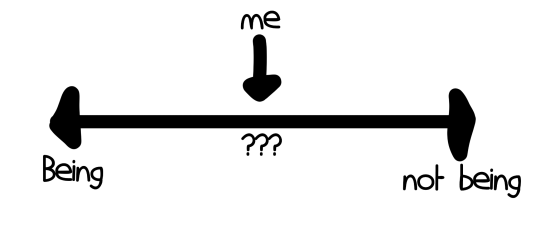
but I don't have all the data
#what is this emotion#what am i feeling#i keep describing it as 'transitional'#because it feels like a liminal space#but not like the creepy backrooms liminal space#i mean like the definition of liminal space which is something something transitional places#idk#i feel transitional#i feel like those stupid dreamcore videos or pictures#it feels ☆wobbly☆#like a cloud that when you look at it you're like 'wow that looks like painting' then you move on with your day#autism brain#can't put emotions into normal words#autism things#yipee#the autism won today#i made a graph to show my emotions#that's really autism of me
3 notes
·
View notes
Text
So @skellydun is back and doing let’s plays on youtube now--if you like low res horror w/ funny charismatic hosts definitely check him out, he’s really good--and his latest video brought back a memory that I haven’t really thought about for a very long time, and thought I might as well share with the internet.
So growing up we couldn’t afford full destination vacations. Mostly when my dad had time off, we’d stay at home, play games, maybe do a few things nearby or find something cool and semi-touristy we could do in a day trip. But my mom has always had a deep and abiding love for the beach, which was just far enough to make day trips a pain. So what we ended up doing a handful of times in my tween years was go, stay for a couple of nights, be very frugal while we were there, and go home.
But as I said, we couldn’t afford much. And by couldn’t afford much, I mean the decent hotels around our usual beach were by far out of our reach. What we could afford was a couple of nights at a cheap motel. Back then (I’m talking late 90′s) it was still a pretty family-friendly area, even still, but...yeah. There were some that my mom took one look at (or one smell) and walked right back to the car. (Fun fact: one of the ones that actually met our low bar made the news a couple of decades later for an outbreak of Legionnaire’s disease!)
If you’ve never stayed at a run down motel, I actually recommend trying it at least once. Not alone. Especially not alone if you’re a woman. But it’s an odd, liminal experience that I don’t know if I’ve had anywhere else. You can’t sleep. You won’t. (If you do, it’s not that run down.) You’ll watch old tv and sit out on the balcony in the middle of the night in a space where everything’s transitional and time has no meaning besides ‘not light yet.’ It kind of sucks, and is kind of magic, and you’ll be glad when it’s over and you’re drinking coffee at sunrise and moving on. (Also bring your own pillows, don’t walk on the carpet in your bare feet, and wear sweatpants to bed, trust me on this)
So after a while we did find a decent spot that was fairly clean, didn’t have too many problems, and wasn’t too far from the beach, and we went back there a few times. It was nice, and I have plenty of good memories of that place.
Except the last time we went on one of these trips.
It was high summer and our usual place was full. I don’t know if my parents forgot to make reservations, or if it wasn’t something we usually bothered with, but there we were with our bags in our car and doing our old routine of trying to find a place that wasn’t too moldy or visibly stained.
Fortunately up the same road a little bit was another motel that wasn’t full. It even looked similar to the other one, it may have been built at the same time. It even was clean. So we took a room, went off to have fun, and didn’t think too much about it.
Until it was night and we were trying to sleep. And the guys in the room next door (I think they were college-aged) apparently thought this was a GREAT time to have a party! Loud, thumping music, yelling voices, all up against our wall. We were annoyed as hell, but did our best to ignore it for a while.
Until they started banging on our door.
They banged loud and long, and started shouting for help. There were several of them. Maybe they actually needed help, god knows. They definitely sounded drunk and/or high. But yelling and pounding on the door and trying to peek in the window of the family next door was NOT the way to get us to open up.
We absolutely did not help. We sat there with the lights off, trying to be completely silent, hoping they’d think we were out somewhere. My mom was by the bed trying to figure out the motel phone (press these series of digits for an outside line! Then dial the long number on the back of the phone card you have purchased at any convenience store in the area!) so that we could call the cops, but couldn’t get it to work. As I mentioned before, this was the 90s, so no cell phones. So we just...hid. And hoped they’d give up trying to pound down the door and that nothing worse would happen.
They gave up pounding on the door.
In the morning, we got the fuck out of there.
I was already in the car, so I heard this part from my mom secondhand (I don’t think she would have wanted me there anyway): As we were putting our stuff in the car, my mom bumped into the lady who ran the place, as she was already starting to straighten out the rooms. (Again, these were small, cheap places that didn’t have a lot of (or any) staff, maybe 7-8 rooms total.) My mom, of course, told her what happened. Naturally she was like “what the fuck I don’t run a place like that” and right there and then, with my mom, she took her master key and opened up the guys’ room.
The boys staying there were already long gone. Their room was covered in blood.
#don't even know what to tag this really#cw: blood#cw: creeps#true story#iirc they trashed the room too#so yeah we didn't really do vacations after that
133 notes
·
View notes
Note
Hey there! I get most of my bl recs from this blog, and I was reading through your Minato's Laundromat watch along post. I was going to watch it but the age gap really messes me up? In Old Fashion Cupcake they have a large age gap but they're still both adults. I suppose it's because of my own past, but a 17 year old with a 27 year old makes me uncomfortable. Would you be okay with the same age gap if it was irl, or only in fiction? Please take no offence to this question, btw, I'm trying to figure out if I should watch it or not.
Age Gap & BL - Taboo, Morality, Teenagers & Laundromats
Ooo, age gap. Well this might just be another JBL whips ABL into a verbal frenzy situation. You ready?
Age gap is one of those tropes that edges into taboo, so like the stepbrothers trope, you may have internalized trauma or cultural conditioning around it.
You may never be able to watch these kinds of BLs no matter what I say or what Japan does about it. And that’s fine! Please know your own limits.
Some of us have baggage around childhood, and allowing children to be children, and adults interfacing with children, and age of consent, and sexual awakening and maturity.
But it means to talk about the romantic and erotic nature of an age gap romance, we gotta talk about culture for a moment.

When does a child become an adult?
Certain cultures have a more fixed age of consent than others. Japan’s, as I talk about in my Coin watch along post, is more flexible than the USA, for example.
Anthropologically speaking, this is something to examine about yourself. What constitutes “growing up” to you?
Is it a fixed line you cross (like a birthday) - what we would call ascribed status, or is is a thing you earn = achieved status? Is it wisdom or education?
In some places, it’s the moment a biological woman gets her period or after a biological man’s voice breaks.
In others, it’s the moment she puts on a head scarf or lengthens her skirt.
It’s the moment he kills his first big game or weaves feathers into his hair.
In some places, it centers around controlling procreation and the feminine.
In others, it is about protection and the fear of youth being exploited.
In others, it’s about a transition from one role in the group to another new role in society.
Everywhere it is about crossing a threshold.
How big is that threshold, how wide that line? How much time does it occupy in our cultural consciousness? This is what teen’s grapple with. That liminal space between childhood and adulthood. How frustrating to have to exist there. How necessary to form cohesive identity. How do they know, how do we know, when they have crossed through and come out the other side?
Who decides this for you? Who decides this ABOUT you? The government? The legal system? The family unit? Yourself? Your religion? A big fuck-off party?
Why 18? Why 21? Why can 18 not fuck 17 but can fuck 21? Did you feel ready to date, to have sex, when you were 18? Or were you ready before that, after, never? Is sexuality even really an indication of adultness to you?
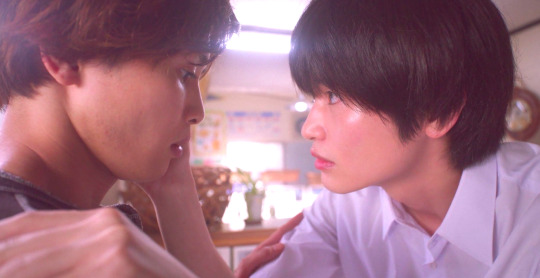
Would I be okay with the same age gap if it was irl, or only in fiction?
My personal perspective:
I’ve talked about this before but I came into sexual identity and desire very early, but I didn’t really date or have sex until comparatively late, and it took me longer than that to unearth my own kinks and queerness.
My parents were very permissive and I knew how to be safe and so I could have done anything I wanted to, probubly from 14 on, which is one of the reasons I didn’t.
I’ve dated up to 10 years older, and over 10 years younger, but always individuals who were qualified as legal adults by any standards.
I do think there are plenty of people too young for sex, by any definition. Certainly plenty of 18 year olds too young for it.
I am personally squicked out by the idea of engaging in any level of intimacy with much younger lovers at this point in my life. It seems like too much work and boring and also a little gross.
But I also believe in giving children responsibility, discipline, autonomy, freedom, and high functioning tasks. I do not agree with helicopter parenting or infantilization. I had my first job when I was 10. Outside the home. I liked it. I learned a lot. I traveled internationally alone for the first time when I was 8. This skews my perspective on what it means to be mature.

Would I be okay with 17 + 27 IRL?
Probubly not but it would depend on the power dynamic. If class, culture, finances, and/or gender made it clear the older person was calling all the shots while being in the position of power, I would be highly uncomfortable. I might even interfere. (If there’s a sugar daddy relationship going on I would probubly make inquiries as to the nature of the contract, and that the younger sub understood their dynamic properly. In the D/s world I do think Dominants have a responsibility to oversee other Dominants for abuse patterns.)
In fiction, I am thinking of Alexis Hall’s For Real which is an excellent gay romance about a large age, wealth, life, experience, EVERYTHING gap where the Dom is a young college age kid and the sub is an established doctor. It’s brilliant and it tackles many of these things. I highly recommend it.
Fiction allows for a certain amount of suspension of disbelief. Also it allows us to see into intimacy in a way we ordinarily can’t outside of our own lives.
Shin is younger but he is also VERY MUCH the aggressor. He makes all the first moves. They have not kissed, at these ages, and I do not think they will.
I’m going to ask you a question.
How would this age dynamic make you feel if it were say: man 18 & woman 28, and he’s a freshman in college and she’s in a comfortingly genderized service job, say waitress? How about if he is a young CEO and she’s his secretary?
Is part of the discomfort coming from the gayness? (Because in the west there is a long history of cultural association between gay & pedophile which is very insidious and his impacted the queer community quite severely, it may be acting on your subconscious.)
Is part of the discomfort coming from the life state? High School. Is leaving high school actually a conference of maturity, or just a societal excuse we westerners use to sluff off our filial responsibility to our youth?
Is it all about the fixed age? Is there really that a big a jump between 17 and 18 or does it just make us feel better because certain laws say 18 = adult?
It’s worth making yourself uncomfortable with thought experiments around this dynamic to try to understand why you feel this way. After all, you gave me a thought experiment, I’m just returning the favor.
But honestly this is part of Coin’s point. To make you think about what it means to be adult and mature. To make you uncomfortable as a watcher.
Cupcake versus Coin
Okay the interesting thing about comparing Old Fashion Cupcake (AKA Cupcake) to Minato’s Laundromat (AKA Coin) is that they are actually quite similar.
Younger seme by 10 years is the one doing the pursuing.
Older uke behaves in a childish and flirtatious manner as part of his personality.
Both semes are clearly sexually frustrated.
Both have pined for a decade.
Both narratives are from Japan.
But in Cupcake the age gap almost amusing. Especially to some of us. That the characters are even worried about this kind of age gap, at their age? It’s silly. Why?

Well, the age gap is there, but really these two are at the same life stage, so it’s not the driver of the story. Emotional maturity is. Learning how to love and appreciate yourself (and what time has beaten you into) so you can be open to affection and sensation and life. Togawa is defined by his willingness to participate in all the world has to offer - those HAMSTER cheeks, are a way of showing his unconsciousness indulgence in sensation. While Nozue is defined by his careful withdrawal, his unwillingness to participate, to take risks, and his own self-hatred and sadness because he KNOWS, he is mature enough to realize, that he did this to himself.
Neither Minato nor Shin are mature in this regard. Both characters are not self aware. Both characters lack emotional IQ. Shin is incapable of teaching Minato how to open himself back up to affection, because Shin does not have enough life experience to empathize with why Minato ran away and shut down in the first place.
Shin is too young. He thinks he would never run. He thinks love is the answer. He thinks love is enough.
It’s never is.

Minato’s Laundromat is a high school student paired with a grown (if immature) man. Same character dynamics as Cupcake. Same age gap as Cupcake. But this narrative must face its age gap head on. And that’s why it’s making people uncomfortable.
Japan is using to Coin tackle notions of maturity but not just sexual awakening and desire, but how maturity translates to emotional intelligence and ownership of self.
Both characters are mature in certain ways.

Shin is the eldest of a large family, he’s basically raised his siblings, he’s taught himself to cook, he’s driven in his studies, he wants to become a doctor. He knows how to be a boyfriend, or he thinks he does. He knows what he desires. He knows how to ask and he knows how to flirt. Shin knows who he is and what he wants and that is mature, but also he is performing the role of a seme as he thinks it’s supposed to be undertaken. He is acting the role of the boyfriend that he has read about in his comic books, it’s not (yet) natural to him, the way it is to Togawa. But he doens’t realize this because he’s too young.
Minato has two failed relationships behind him and a failed career. He knows what it is to hurt. He knows things don’t work out. He knows wanting a thing is not the same as having it and holding on. He has found his way to a kind of peace, and kind of inertia. Unlike Nozue, he is genuinely happy, he’s not at all lost, but he is hiding, and he is scared. But this he knows about himself. Minato is hiding that he is gay, he is acting in a way to fit back into his home, but at heart he is an open and honest person, naturally kind and gregarious, so he too is acting, performing a role, it’s just he knows it.
Both Cupcake and Coin are about bravery, but in the one case we have a clear model example of how to be brave, an end goal, and it is Togawa. In the other we have conflict over bravery, because it means something different when you are at different life stages.

Shin can be as brave as humanly possible, and he is constantly putting himself out there, constantly asking and begging and pushing Minato to give in to their desires. But while that may be a model of courage, it is not safe for Minato. Minato’s bravery is in resisting. Is in not giving in. And it will eventually be in hurting Shin to drive him away. Even lying to Shin about his feelings.
Shin cannot be trusted because he is too young. For no other reason. The age gap is the problem because of life experience. This story isn’t really about whether it’s “okay” for them to sleep together because that is just not going to happen, no matter what Shin thinks. And any perceptive watcher with know this. (Also this is not dark JBL, dark JBL would have gone there.)
Minato may be immature but he has a fixed moral compass. This story isn’t about that or sacrificing self for desire, those kinds of discourses are left to the older BLs and noona romances, Japan has already tackled it. They’re moving on.

Shin can only be brave, it’s all he knows to try. He cannot be patient. He cannot give up. Minato can only be a coward, it’s all he’s ever been. His only experience is in taking a risk and hurting himself, or taking a risk by betraying his own identity and hurting others.
Minato sees only one outcome: hurt, either his pain or Shin’s. His maturity will be in realizing that the right thing to do will hurt both of them. But for now he remains in limbo, unable to lie and say “I don’t want Shin,” because he is an honest person and he does want Shin.
But also unable to say yes because everything in him is screaming that even if it were right, this is the wrong time. Shin is, by any measure, too young. Minato’s instinct is to run, but he has already run to his hometown and laundromat for safety. And now Shin is challenging him in that space too.
This is what makes this show so tense. We know Minato will not crumble, but the challenge is constant and it is real. And it makes us all, including Minato and Shin, feel unsafe.
Shin is making Minato’s place of refuge unsafe. Minato has nowhere else to go. That’s why this show it titled the way it is.
The laundromat is being used as a metaphor for Minato’s life state.
That’s why each ep always opens and closes on the laundromat. That’s why Shin in ALWAYS depicted in doorways. Between inside and out, one room and another.
Shin is shown coming inside Minato’s spaces.
Shin is desperate to be invited into Minato’s home.
Minato goes outside the building to confront Shin.
Shin waits on the threshold, fainting from heatstroke. Because... he cannot wait.
Because Shin is a teenager, his is in that liminal time of life. He is neither child nor adult. He is himself the spirit of transition. This series is using him occupying thresholds as a metaphor for his life state. He is both AT a threshold and IS a threshold.
Shin is in motion, trying to fit, trying to occupy Minato’s space. In and out of the doorways of Minato’s safe little life, his laundromat. Minato who is ahead of him, settled, hiding under blankets, tending to his machines, embraced by his community, home.
Shin thinks Minato is his home. Is his destination.
And the horror of this show is that there is a distinct possibility that Shin is right.
Minato knows this.
And so do we.
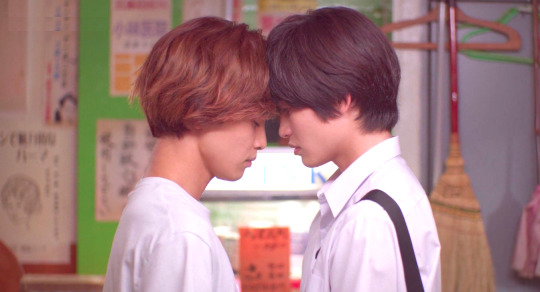
It’s just this is not the right time. Shin hasn’t had a journey yet. You can’t come home, if you never leave it. And you can’t appreciate it, if you never go. That’s the nature of growing up.
Shin may have found his nest. But is it his, if he never learned to fly?
So it is Minato we must trust not to make a mistake. Because Shin is absolutely going to. Shin has put Minato in the position of having to push him out of the nest and watch him fall. Watch him get hurt. Watch him fly away. Minato who actually wants to be the safety net, who saves children from drowning, who wants so desperately to be loved. Minato is going to have to act in a way that is not only disingenuous to his own character, but that he knows Shin will see as a betrayal. Minato is going to have to hope that Shin will go away and grow up and realize that such a betrayal was actually an act of love.
Wether you like this show will depend on whether you trust Minato to do that. Or trust the narrative.
So I can’t answer whether you should watch it yet, because i don’t know. I do trust it. But this is Japan, they always surprise me.
(source)
#japanese bl#flipping heck i have a lot to say these days#JBL#adapted from a manga#live action yaoi#ShinMinato#Old Fashion Cupcake#Old Fashioned Cupcake#Minato Shoji Koinrandori#Minato Shoji Coin Laundry#Minato Shouji Coin Laundry#Minato’s Laundromat#age gap romances
276 notes
·
View notes
Text
seven songs I’ve loved forever
@flippyspoon tagged me to share seven songs I’ve loved forever and will love forever and listen to a million times (and have maybe put on too many playlists but that’s not a requirement) (but let’s be honest, I probably have). And it was beautifully timed, because I was just thinking I should make a playlist for my holiday exchange fic, which means I’m definitely in that musical headspace! So, without further ado...
The Cure - Burn. Self-explanatory, especially around this time of year. Give me all those sweet sweet angsty goth vibes.
George Gershwin - Rhapsody in Blue. The 1959 Leonard Bernstein + Columbia Symphony Orchestra performance (linked) is by far my favorite extant recording—the syncopation, the jazziness, the absolute life they put into the score. The sheer drawn-out passionate WAIL of the clarinet solo at the opening! Now that’s jazz.
The Verve - Bittersweet Symphony. Instantly familiar to any of us who grew up in the 90s, even people like me who had a weird relationship with popular culture at the time. One of those tracks that will forever evoke a particular mood and time in my mind, even when I haven’t heard it in years.
Rachel Rose Mitchell - Voidfish (Plural). A fanwork for The Adventure Zone, Mitchell takes a simple theme from a song-puzzle and spins it out into something so hauntingly dreamy and evocative and epic that the McElroys ended up using it (with permission) to great effect in the penultimate episode of that arc.
Poe - Not a Virgin. I love me some unsubtle metaphors and clever wordplay and musical brashness and refusal to bow to the weight of social expectation. I wish there was half a chance in hell I could find this on a karaoke playlist someday, I’d give a lot to be able to perform it.
Cigarettes After Sex - Nothing’s Gonna Hurt You Baby. @trashcangimmick teases me that he can tell if I’ve made a playlist based on whether this track is on it. He’s...not wrong. Despite having only come across it a couple of years ago, it’s one of my most-listened tracks.
Nickel Creek - When in Rome. Nickel Creek was one of my first concerts—they came up to Fairbanks (of all places) the year I started college there, and my then-girlfriend’s parents took us to see them. This particular song came along a little later, right at the time when I was transitioning into adulthood, and I listen to it often when I’m in that kind of liminal space, reassessing my perception of the world and where I fit into it.
Obviously there are many, many more, but this is what came to mind today. So, @skybound2, @ihni, @rhubarbdreams, @neonelectriclady, @blahblahblahcollapse, @twobrokenwyngs, and @oephelia—what songs come to mind for you?
#tag games#songs I've loved forever#music#nickel creek#cigarettes after sex#poe#rachel rose mitchell#the verve#george gershwin#the cure
19 notes
·
View notes
Text
More Hamlet Thoughts because i leave everything to the 11th hour . production continues to be the 2018 globe w/ Michelle Terry
Hamlet and Ophelia’s uhhhhh fight
Ham’s personality twists into cruel mockery of her at the line ‘Where’s your father’ and OHO the facial expressions
Ophelia kept trying to hold onto Hamlet’s hand and body and curl her fingers around hamlet’s hand and it was very heartbreaking . Hamlet was a ball of chaotic energy who scrabbled her hands off himself. rlly interesting to watch
this turned around with hamlet scrubbing over her face as he presents her to the audience’s 4th wall for the make up lines. and shoves her down to the floor at the end
the physical manipulation hamlet takes out on ophelia is a super interesting segue to the players scene
2 b / x 2 b
ham sat in the middle of the front of the stage and held the hand of an audience member who he talked he speech to. very intimate and closed and really interesting interpretation
im a nerd so i really like the juxtaposition of such a grand and philosophical speech being told on such an intimate and small scale
Hamlet’s still got his smudged clown makeup on
hamlet and horatio come across Very gay in the ‘something too much of this’ line. i vibe
hamlet decimated his friendship with R&G and i LOVED how Horatio held him and then forced him away to give him just a touch more character. this Ht loved R&G as well and i appreciate the bit of character we all try to give horatio
Horatio’s Emotions over R&G’s impending death is a++ give this man some emotional range
OH the ‘if your mind dislike anything, obey it’ can we PLEASE listen to horatio the lone voice of reason within elsinor’s halls
that’s not me being gay, that’s a legit analysis of Hamlet in that everyone in Elsinor has a twisted sense of reality and morality and Horatio as an outsider is immune and must watch in horror
the argument is flawed with R&G but hey it’s not my theory.
THE TRUMPETS . there’s live trumpets
the music they played to signal the half time of the play was wonderfully dissonant and i VIBE WITH THAT that is the ENERGY of Elsinor right there
honestly im annoying and i don’t particularly care for the play scene as an audience member. like academically the play within a play is rife with analysis but like. to just sit and watch it feels like such a halt in the energy
plus i really dislike it when they use gross physical comedy in the dumb-show because again. im annoying
anyway they only do the dumb-show (more tollerable than a lot) and they use drum beats and purcussion in place of lines, and have hamlet explain what’s going on with his lines. it’s certainly different and its a lot quicker than the text is
This Claudius is Prime Smarmy Politicians and is very indignant as he tries to pray and i REALLY LIKE HIM
The scene transitions are .. non existent in this play and i LIKE IT
the lines follow on immediately between scenes as the other characters are leaving the stage
i love how it supports the theme of acting this play has and how it breaks down the barrier for the audience of personal vs private
thats not quite what i want to say uhhhhh. in other productions some of the scenes are really discreet from each other- like how pearl necklaces have stoppers between the pearls- and that’s especially evident in films, but here it’s the opposite and the scenes bleed into each other to create a really fast paced and chaotic energy and i REALLY LIKE IT
‘personal vs private’ is on god my favourite theme in hamlet and the way it works with the audience creating it here is GREAT
Closet scene... OH BOY
this hamlet is CRUEL oml
the ghost enters after hamlet spends 3 minutes berating his mother and she’s crying on the floor by the audience and hamlet immediately stops and starts weeping
‘oh save me’ sounds so small and childlike and it really showcases the love between them
not that kind of love, sigmund fucking freud. get your mind out the gutter
the disdain hamlet has for gertrude absolutely breaks my heart but that’s a me thing because i haven’t been able to see my mother in person for coming up on a month due to quarantine :(
added an extra hug before ham leaves .. v sweet
Claudius comes barreling in and picks up ham’s dropped sword. :eye emoji: doesn’t put it down until Hamlet’s brought in for questioning. but he’s still holding a book (english dictionary presumably?) and this act of holding a sword for 2 scenes WILL be reiterated time and time again in ever hamlet essay i write forever to whatever end i so desire because it’s easy to manipulate to my own purposes. bless this moment
There’s a seagull that keeps interrupting claudius at perhaps the funniest possible moments in his soliloquies and honestly WHERE is it’s Olivier
Ophelia’s madness isn’t as explicit as it is in other versions, but watching her tumble into emotions and lack of restraint is so, so heartbreaking.
this is one of the productions of hamlet that makes a really convincing case for ‘madness’ in elsinor being synonymous to speaking one’s mind and being truthful about one’s heightened emotions and like. i Love that interpretation
lets be real i love 99% of hamlet interpretations
the 1% is freud. fuck that guy
I’m Digging the parallel of Ophelia’s emotional outburts of grief (in madness) to Laertes incensed outburst of grief . ohoho
Laertes gets rosemary and pansies, Claudius gets fennel and columbines, Gertrude gets the rue, Audience member gets the daisy and the thought of violets
unfortunately i once wrote a shite poem about gertrude and weather she know of the poison in the cup at the end and unfortunately that’s all i can think about for the last 40 mins of the play hfdhgjgghjhgj
im annoying so i read along with the play and the duets Claudius and Laertes make of the meter and the word formatting on the page comes across really different on stage, which is super interesting.
not to be really fucking dramatic but i read in the info packet of this play that the pillars on the stage are actually tree trunks carved and painted to look like marble and considering how many times i had to hear the words ‘appearance vs reality’ in my english class, i think im allowed to use the smirk emoji about how the setting of the globe is Integral to Hamlet as a play
i am itching to write an entire 4000 word tirade about the use of the physical body in hamlet because between the actual acting on stage, polonius, ‘one auspicious and one dropping eye’ and all whole host of references made to physical body parts i am going feral
PLUS this one incorporates sign language
i actually hate the word incorporates but needs must
The Ophelia’s death speech is of course wonderful, but i can’t stop thinking about how John Everett Millais made his model (who’s name escapes me in a terrible irony because i got this information from an exhibition about the female pre-raphalites) sit in a cold bath for hours on end whilst he sketched and it made her very ill because the fire went out and she was sat nude in a bath of cold water for hours.
Gravedigger only has the songs and the hamlet interaction, and he wears a high vis jacket. he’s also played by the ghost’s actor, which whilst understandable in such a small cast, amuses me greatly
Hamlet’s got his hair tied back and in a military style jacket, and marches around with Horatio who’s in a hoodie and a black duffle coat (absolutely a student) and the same tight plait. Ham’s definitely meant to be sane now, he speaks very brusquely and all but marches around the stage
Not To Make An Edelgard Reference But edelgard’s cause in 3H was also cemented by a timeskip and a military outfit and a brusque personality hehehe
Hamlet gets into the ‘grave’ to chat to Yorick which, again, i will use in every relevant essay i will write and manipulate this scene to whatever end i desire and on god i thank this production for this
a level me would have gone feral
current me is also going feral
Grave Scene: a terrible one for your family to walk in and ask what the fuck you’re watching
Polonius’ actor plays the priest. yes, capsule wardrobe of a cast, i know but i’m an english student it’s my duty to wring every irrational inch of analysis out of this thing
i won’t trail on about unsubstaniated interpretations of Polonius’ parenting skills and fate in Hamlet but on god i will find an essay about it
i always enjoy it when someone leaps in the grave .. the melodrama... the meaning... the liminal spaces...
the DRAMA of seperating feral laertes and the really calm and imposing hamlet is excellent and a bit hilarious and the camera is going nuts
i’m very aware that everyone is now traipsing about over the grave in the middle of the stage and THAT’S a fun dynamic you don’t get from film or text
ok I’ve just noticed the video has the ‘top chat replay’ going and the very first line i saw is ‘what if hamlet had tiktok’ and i am CRYING
Ophelia’s actor also plays Osric and is a) absolutely hilarious and b) again, capsule wardrobe of a cast will not stop me from analysing everything and anything this play may or may not offer me.
im not saying hamlet is a play about inheritance and the burden of it, but also... isn’t it :eye emoji:
if bloody fire emblem fates can do it so can i, step off
Fencing scene: oh thank god it’s nearly over
The hearts on their fencing get ups parallel Hamlet’s clown outfit with a heart on the sleeve Very Nicely
Gertrude isn’t wearing her headpiece anymore .. ohoho dispelling the trappings and suits of dishonesty, if you will
The duel is a) bloody terrifying because sword fighting and b) judged by Osric (Ophelia) and the poetry of having ham & lae’s duel waged over and judged by Ophelia is absolutely excellent
Claudius’s aside (or to laertes? camera didn’t follow) had no right to be as humorous as it was jdfsghfkd
Gertrude figured out it was poison in this one. Nice
I like the call and response effect of ‘Treachery! Seek it out! / It is here Hamlet’ they made with Hamlet running around they stage to find little propped up Laertes
The dramatic eye contact of Hamlet and Claudius as he forces him to drink the poison.... OH HECK YES
the way they sink to the floor in a pair, with hamlet crawling over his body to make sure he dies... oh LORD
the swing hamlet does with his arm to the audience to cast them as ‘the unsatisfied’ was EXCELLENT and i would like that in every production of hamlet please
the tussle of horatio and hamlet over the cup..... iconic.... and i enjoy the parallel of that to hamlet with claudius as they’re stood in the same corner
The harsh projection of Hamlet’s voice and the blunt manner of his words about Fortinbras’ inheritance of denmark against the soft way Horatio rocks Hamlet back and forth ... i want to CRY
Horatio got to have emotional range in this production .. wonderful
i always enjoy the way the play tails off with politics in a room of dead bodies.. the layers the absolute onions
how none of the drama within the castle has any meaning to anyone outside of it is Excellent
and then the way the prison and enclosure of elsinor is finally broken with military force in parallel to the tumultuous interpersonal relationships within it... i vibe yet more
they actually ended with ‘go bid the soldiers shoot’ which i enjoy a lot!!!! and the music is wonderful
then they all start doing this dance which i think is meant to be about the themes of the play and to be perfectly honest it’s a bit crunchy for me but the music absolutely slaps!!!
final thoughts:
that sure was a hamlet production and i thought it had a lot of heart and did some new things very very well!!!
and i loved the emphasis they put on the costuming!!!!
overall: a solid hamlet. very nice. i greatly enjoyed it!!!!
9 notes
·
View notes
Text
Quotes of Wisdom 2k19
Happy New Years, peeps!! I hope 2020 has been starting out well for you! Here's some context before we start.
For all of 2019, I developed a list of quotes that I have uttered from January all the way to December. These are things I've said out loud that have either helped my friends or have earned me some questionable looks.
Either way, let's get into it!!
<><><><><><><><><>
"A tree as old as time will feel inadequate should it compare it's worth to the shine of a gemstone." - Esh, during a convo where she was trying to comfort a friend who felt inadequate.
"Scream into the night so that the morning may hear the echoes." - Esh after being asked what she was thinking about while disassociating.
"You're my stars that light up the dark, bleak skies of my darkest hours." - Esh after being comforted out of an anxiety ridden depressive episode.
"And what are our eyes but windows to the universes we hold inside ourselves?" - Esh during one of her Space Nerd/Universal Awe at existence moments.
"The nature of humanity is to repeat history, for it seems they cannot learn from the mistakes of their ancestors." - Esh after being done with Humanity for the umpteenth time.
"Who you are will never truly leave you." - Esh, replying to something her sister said.
"I want to see the world be as beautiful as the stardust it was born from." - Esh, during a daydream.
"I want to scream into the abyss. But will she scream back?" Esh after being asked how she is feeling.
"Sometimes we feel empty, incomplete, as if life has lost its meaning. But keep going, for there is always something or someone out there that will make you feel like you have a heart again. You just have to find it." Esh, laying in bed contemplating the meaning of life.
"My heart lies beyond the reaches of this world. I eagerly await the day I return to it." Esh, immediately after the previous quote.
"I am but a corpse, kept animated by the ludicrous amount of salt and preservatives I consume. If I start eating healthy, I will rot." Esh while eating at a restaurant.
"Matter cannot be created or destroyed, only dispersed into the energy that makes up its atoms. Thus, our atoms are as old as the universe itself. Which makes us as old as the universe, too. You hold ancient knowledge in your cells." - Esh, after drinking too much caffiene
"Even the ground would not want you to rot within it." - Esh, reciting a threat for a Star Wars fanfiction.
"Do you feel the fear within your veins? I do. My heart is burning. My emotions have transcended beyond anything I can comprehend." - Esh, speaking of her visceral fear of the IKEA hive.
"God left me a long time ago. When he gazed into my eyes when they first opened, he saw not a sheep but a llama. And I am pretty sure I spit in his face when I was a kid, because baby me was, indeed, that much of a little shit." - Esh's brain thinking without her consent.
"I can say I am angry, that my heart burns with rage towards humanity as we know it. Or I could say my passionate yearning for the safety of those I care about is so strong that I am willing to uproot society as we know it. One is definitely a better mindset than the other." - Esh during another episode where she yearns to destroy humanity.
"What if the path I wish to trek is not a path He can follow me down?" - Esh, aftering being asked to join a church group.
"God is not dead. But he wishes he was." - Esh's brain, in a disembodied voice that was not Esh.
"Innocent? Any innocence I might have had was ripped from me long ago. I probably purged it when I screamed in Wal-Mart when my parents didn't get me the toy I wanted." - Esh, after being called "innocent".
"I do not cry because I am weak. I cry because I have been too strong for too long." - Esh during a dream.
"Inadequate is your argument! Bugs must have infested your throat, for all I hear from you is meaningless buzzing!" - Esh, reciting a Draggolph insult.
"Different are my mind and eyes. People see the world as they were taught. Do others see it like I do? Does humanity see the beauty in this world? Or do they see it all in monotones, dull, and lifeless? Like I have been these past few weeks?" - Esh during a creative personal narrative.
"I see the world in words. The Universe is telling a story, so I listen." - Esh, explaining how she sees the world.
"The version of you people create in their heads is not your responsibility. You cannot change someone who is committed to misunderstanding you, nor are you obligated to change to fit their image of you. Be you and find people who will understand you and love you for who you are." - Esh. No context. She was scrolling Tumblr and suddenly thought of this.
"I'm so tired. ("Of what?" Asked her friend.) Of being alive in such a Hell strewn world, of having to conform to survive, of having to hide my true self because it would be detrimental to my life. That I cannot breathe. I ask for air, but they merely push me further into my grave." - Esh during a small depressive episode. She was playing Minecraft a few minutes later.
"He told her she was as clear as a musical note, as sincere as a melody. What does that make me? I do not feel clear, but many say I am sincere. I think. Am I dubstep?" - Esh pondering life.
"I find it tiring that society these days is more of a masquerade than a civilization." - Esh after waking up on a Monday.
"I wish to exist in a way where people feel like they are merely waiting in a liminal space. We meet, we talk, but you feel mostly like you're transitioning to a new state of mind or existence. You voice this and look over to me for my opinion. I am gone. Your memory is faded. All you see are colors and abstract shapes in place of our conversation. You are left with the vague sense that you just met someone." Esh during a depressive state while walking to theatre.
"Do not blame me for a sin I have not committed." - Esh after being blamed for making a pizza box too hard to open. It was the delivery guys fault, not mine. I swear.
"Humanity bases their most terrifying beasts off of themselves, for they know nothing more monsterous." Esh, during an English Lecture.
"If I cannot feel the abs of my beloved, then I will get in shape and grow my own to compensate." Esh missing her datemate.
“Netflix and chill? I call it Egg Cream Brûlée” - Esh being horny in her own unique way.
"Humanity is something I lost a long time ago. Call me a monster all you wish, I'd rather be a beast than a human." - Esh during a daydream.
"I know not how many more tears I am willing to give this world." - Esh, during a small depressive episode.
"A child's judgement is second only to Gods'." - Esh
"I want to see them burn in the flames of their own sins." - Esh declaring war against her asshole roommates.
"Exist on the second dimension like the shadow you cast." - Esh during an inspirational rant.
"This world is made out of dreams, and many of them are becoming quite stale or nightmarish. So why not add yours so we can get some fresh air?" - Esh during that same inspirational rant.
"The mind is a prison. One that I willingly subject myself to. For now at least." - A text almost sent by Esh until she realized the context of the conversation.
"I'd rather be a beast of beasts than be a slave to the corrupted." - Esh talking about her yearning to go into politics so she can fix shit.
"My home will always hold my heart. No matter how far away it is, no matter how alone I may feel, I know I have a home to return to. I know they'll wait for me. But by the gods, it hurts to be unable to hear their heartbeats." - Esh, missing home on Christmas Eve.
"Until I can hear your heart again, wait for me." - Esh, right after the last quote. By Chaos, I was homesick af
<><><><><><><><><>
Now to get started on 2020 Quotes of Wisdom!
Also I'm tagging my sibs @square-stingray @snoodly-boop
5 notes
·
View notes
Text
Transcript: Home Brew 07: Abandoned Places, Liminal Spaces
Hey ya’ll! Thanks so much for supporting ☕Home Brew☕ thus far - especially because we a still a pretty young podcast and not yet in the wide world of Apple/Google yet.
Ever since Danny and I dreamed up this project, accessibility has always been a part of our vision - especially as audio recordings can be tough for some of our audience to process. Thanks to some kind and incredible volunteers, we will be able to bring you transcripts of the episodes soon after they are published!
Please explore this transcript of our latest episode at your leisure and look forward to more transcripts to be posted here and on the homebrewpodcast.podbean.com page.
Thanks again everyone!
-Johna💚
Transcript: Home Brew 07: Abandoned Places, Liminal Spaces
Order of events:
☕ Make Talk Good
☕ Main topic: LIMINAL SPACES!!!
☕ Mythic feature: John Henry: The Steel Drivin Man
☕ Devotional thought with Danny
DANNY: Hi, and welcome to Home Brew podcast. I'm Danny…
JOHNA: And I’m Johna, two pagan friends exploring spirituality in the Modern Age.
DANNY: We’re queer…
JOHNA: And definitely not so white.
DANNY: So please be aware that we are grown-ups, who may discuss sensitive topics as they relate to our own experiences.
JOHNA: That being said, we welcome and incorporate the experiences of our listeners. You can contribute by messaging homebrewpodcast.tumblr.com—
DANNY: Or by tagging @homebrewpagans on Twitter. And so, let’s get into the episode!
[transition music]
JOHNA: All right, we have our order of events. The first thing on our list is Make Talk Good, as per usual.
DANNY: And, we are very very excited to introduce our main topic, which is liminal spaces, specifically abandoned places.
JOHNA: [chuckle] So after we’re done being nerds about that, I am going to share a myth with you. This is going to be the Ballad of John Henry, the steel-drivin’ man.
DANNY: And we're going to close out with a devotional thought about plants! [chuckle]
JOHNA: Yay!
DANNY: Yay!
JOHNA: [sing-song] Make…Talk…Good!
It's Make Talk Good again. This is our update on our language learning efforts, which are an act of ancestor veneration. So, let me tell you what I have for this week. It is “Paki-ulit?”
DANNY: Ooh!
JOHNNA: “Please, paki-ulit?” Uh, so, okay, Danny, let me explain to you. This is like saying, like, “pardon? Excuse me, can you repeat that? Can you do it again?”
DANNY: Oh, okay, okay, okay.
JOHNA: [long sigh] This is important, because there's like a lot that I've tried to learn, but I’m not always able to like, use it, and not always able to, like, talk to other people, and it's hard when you're always learning new things, so just like reviewing what I...you know, started out with since we first started doing this.
You know I learned "Kumusta ang lahat," which is “Hello, everybody.” It was really important to me that I learn that. "Na--[laugh]--Nag-aaral ako ng mga multo." You need to know that I study ghosts. And then there's that, you know, very heartfelt one, "Minsan lahat napupunta sa impyerno," which I feel a lot better about but I also feel more strongly about how everything can go to hell.
DANNY: Yeah. I remember that one. [chuckle]
JOHNA: But things like "Tao po?" Easy. Paki-ulit is going to be regular, so regular. I need that phrase a lot. Pardon me, you guys, I needed time to review. It’s important. [laugh] But how about you, Danny?
DANNY: Um, I can start saying sentences!
JOHNA: Ooh, say a sentence now. Like right now, say a sentence.
DANNY: Oh geez, okay, alright, okay. I'm going to say an untrue sentence. “Ni-TLAca-tl--” Aww, but you know what, I forget that the syllable is not going to be in the middle, it's going to be the second to last syllable, so let me try that again for everybody.
JOHNA: All right, take two!
DANNY: “Ni-tlaCA-tl.” And “Nitlacatl” means “I am a man,” which I am not.
JOHNA: [gasp] You’re not, though!
DANNY: But that is the first sentence that they teach. I'm not, but that's the first sentence that they teach in this book. I'm going to once again plug it. It's called Learn Nahuatl: Language of the Aztecs and Modern Nahuas by Yan Garcia. It's a workbook, it's neat, and I am learning simple sentences. And basically how these simple sentences work—
Last week we talked about plural nouns. And we learned that an, a noun in Nahuatl ends with what's called an absolutive ending. And what we are doing now is we are taking that noun and we are also adding a subject prefix, if you wanna just do a simple sentence.
So, in the sentence that I used, “tlaca” means “man.” What you do is, if I wanted to say, “I am a man,” the way that you would conjugate that noun is to add the prefix “ni-,” so “Nitlacatl,” that's a way smoother way to say it. But, as we kind of covered last week, if it's a plural noun in certain situations, the ending is M-E-H. In this sentence, if I wanted to say “we are men,” I would say “Titlacameh,” instead of “Nitlacatl”.
[sigh] So, pronunciation is still not a strong point, and this is a lot. This is, like, very very different than how they do things in English, um, and they only kind of do this in Latin, which is the only other language I know sort of how to do. But I am very excited to be able to start even conceptualizing simple sentences now, ‘cause so far it's just been, like, kind of words a little bit.
JOHNA: Hell. Yeah. Dude. Awesome. Sooooooooooo…
DANNY: Let's get into our main topic!
JOHNA: [laughs]
DANNY: So, in this episode…this is probably, I want to say, our most dense episode yet. It's not necessarily our heaviest, but it's really packed full of stuff. We cover a lot of terms, we cover a lot of concepts, and we introduce some ideas that are only barely like getting revisited post-Enlightenment in the Western World. So if it feels a little confusing and we get a little academic, hang with us, we just have to kind of cover a couple of things.
So our main topic here is liminal spaces, with a specific focus on abandoned places. The reason why we chose to split this up is that if we just talked about liminal spaces as a whole we would be here for a thousand years.
JOHNA: So many thousands.
DANNY: And it would be way more complicated than, like, anybody is prepared for. Did I discover that I wanted to write a thesis on liminal spaces more than usual when doing this prep? Yes.
JOHNA: [chuckle]
DANNY: But we narrowed it down for you because we wanted to, um, really give each subcategory of liminal space the time it deserves. But we're going to get into a lot of good stuff. But for right now, let’s start with some foundation work.
So, the Merriam-Webster Dictionary defines liminal as “relating to or situated at a sensory threshold, specifically being barely perceptible.” And then space is “a physical space independent of what occupies it.” There are a couple of different definitions that were also listed there, but I picked these two because I felt that they directly related to liminal space as a concept, and also was helpful to connect liminal spaces and abandoned places. A liminal space is a physical place that situates itself between the perceptible, or the real world, and the imperceptible in such a way that creates an overlap between now and the past-slash-future in various ways. Phew! [laugh]
JOHNA: Yes. Okay. That's a good place to start, aaaa… I mean, in layman's terms, I feel like liminal places tend to be busy, you know--
DANNY: Mm-hmm.
JOHNA: --sort of like byways, and that haunted places tend to have, uh, more consistent residents. Even if there is a doorway, there tend to be the same characters around. Does that make sense?
DANNY: It does. And I think, also, before we kind of jump away from haunted places, it’s kind of important to talk about what haunted means. Um, at-at least in terms of how we're, like, looking at it from this podcast. Because we are taking the ‘hauntedness’ out of abandoned places for those who might think that those things are interchangeable.
So let’s kind of go back to the Merriam-Webster dictionary definition. There's two that I really want to kind of chew on. The first definition that I want to kind of look at is haunted as “to visit or inhabit as a ghost.” So that's, like, that was one of the first ones that they list online. But another one, alternative definition, is “to visit often or continually seek the company of.” And I think that that is a more interesting dichotomy for, like, what haunted means. The idea of just visiting often, seeking the company of, is inviting us to consider that things other than ghosts can haunt places.
So while we might consider haunted places to be liminal, and they have liminal qualities, we are going to talk more here, like how you phrased it, like, we're going to talk here more about spiritual byways, rather than like, a haunt. That will be later.
JOHNA: [laugh]
DANNY: So that’s sort of--[laugh] But that’s where we’re approaching this difference.
JOHNA: Mm-hmm. So a common belief among non-western religions is that existence, not just life, is primarily spiritual, and may express itself physically. So this idea has been pretty well eradicated from Western culture, like, particularly after the enlightenment, but it has been something that has been sort of rediscovered by a lot of Western Pagan traditions. So essentially we can recognize this life as an expression of our being, but far from the sum of it.
That invites you to consider, like, how does that apply to things that physical beings have constructed? Does this mean that places and objects existed spiritually, too? Are we able to create spiritual objects or beings by creating them physically first? I think that this is, like, typically the first way that we sort of try to approach that, but that kind of question implies that we're asking whether the chicken comes before the egg. In my theology, and sort of in the perspective of this podcast, pretty much everything is an egg that occasionally makes chicken shapes. You see? Like, you get it? Do you get the--?
DANNY: Yeah, yeah. I kind of love that, too. I like that relationship, I guess, between like our spiritual life and our physical objects we make and like what does what first. And I think that, okay, if we assume “yes,” that at least part of our spiritual life impacts the physical non-living objects we create, it kind of leads, like you were saying, to the question of like, “what happens to these places, objects, spaces when we're done with them?” Like, the idea of leaving a spiritual footprint is how we can kind of connect liminal space to abandoned place.
And I think, also, and here's kind of where things are going to get, um, I guess, a little non-western here, is that time, like you were saying, is a really strong factor here as well. So if a building, for example, can hold onto the physical, the spiritual footprint of those who used to utilize the space, even after the people themselves are gone, then liminal spaces become a really useful tool when conceptualizing how time and spiritual energy becomes less linear than we are accustomed to thinking about that in this day and age. That is to say that liminal spaces sort of become an example of how time exists all at the same time. [chuckle]
Our spiritual footprint kind of leaves the-the energies that we imprinted into the ground on one specific day, and holds it for potentially forever, so that, like, one day that you were there can be sort of suspended in this liminal space for all time. And I think that understanding space as it relates to nonlinear time and overlapping energies can be a really really useful tool when growing in your faith as a pagan, or even just as a spiritual person. I know that personally this kind of interaction with space and liminal spaces has improved my relationship with my gods, um, has simplified and improved how I interact with the natural world, and also how I handle my own mortality and the concept of death as a spiritual person.
JOHNA: Mm-hmm, you know what, I do like that. I like that the Western world is warming up to nonlinear time--now that we have, like, math to theoretically explain it so it's not laughed at as much. But, like, as you continue to deepen a practice with your gods, your ancestors, or just your exalted self, you come to experience, like, dialogue and answered prayers as something that isn't limited to your experience of time, right? Like, you might pray for a job and thank your ancestors for the answered prayer, and then realize that it was possible because they made a demand of you like months before you even needed that job, before the need for that job existed.
So it's difficult to examine how this happens in relation to our own lives, sometimes, when you’re thinking of time totally linearly—
DANNY: Mm-hmm.
JOHNA: --so it helps to, you know, study liminal space instead, and use that as a starting por—sorry, use that as a starting point. So, like, I understand that the way that we talked about this, like, lacks academic nuance sometimes, and, like, for now I'm okay with that ‘cause, you know, when it comes to paranormal subjects, the field is still incredibly new, we still rely on a lot of anecdotal information, but that's not to say that you can't trust your own observational skills.
DANNY: Yes, absolutely. And sort of speaking of anecdotes, I-I do have a lot of perception about liminal spaces with regards to abandoned places in particular, and I wanted to sort of highlight a couple of things to sort of have like a real world example of the concepts that we’re talking about. This is sort of to underline the—the concepts and ideas that we've introduced so far and how I use them in my practice, and also kind of in my hobbies, which, as we all know, end up overlapping eventually.
JOHNA: [chuckle]
DANNY: I very casually do urban exploration. I don't live in a place where it's super easy to do. All of the good good stuff is, uh, really hard to get to, and it’s also hard to find again. If you find, like, a sweet sweet house that you want to get your little fingers in, it's hard to find it later.
BOTH: [laugh]
DANNY: But, and I’ve been doing this for a while, but only recently have I started conceptualizing urban exploration as part of my spiritual exercise, and I find it actually really meditative, sort of before I knew that I-I needed to have a meditative practice. It's a really unique experience for me to sit quietly in a space and to try to feel all of that energy that's ever been there. That is to say, like, if you sit quietly in a messed up house in the middle of nowhere and settle your mind for a second, it really feels like you can feel everything that has ever come in, has ever been around, and has ever passed through that house. And it's a little different than, like, interacting with a forest or, you know, like, your favorite park. It's a, it’s a very very specific energy that is different in every place that you go. And for me that's like, it’s… as closest as I think we can get to straddling a few different worlds, sort of because of the way time happens in liminal spaces. It’s really beautiful.
But I do want to have a disclaimer. [chuckles] And my disclaimer is: please be careful when urban exploring. Be mindful of No Trespassing signs, be mindful of security cameras. You might approach a house that looks really cool, but the structural issues will make it too dangerous to go in. It is not worth dying for the aesthetic. Do not walk into a house that looks like the entire floor is covered in bird shit without a respirator. Do not go onto second floors unless you're absolutely sure that it is safe and secure. I always recommend that you go urban exploring in pairs, at least. I'm happier if people go in groups of three or four, that way if somebody gets hurt you can have someone stay with the person and you have someone go get help. There are times you will lose cell phone reception. That's when you're going to want and need partners. Bring flashlights, bring batteries, don't tag up the joint. Thank you.
JOHNA: Mm-hmm. Good advice from the neighborhood weirdo.
DANNY: That's me!
JOHNA: So I myself, like, I don't like to visit liminal spaces. I like to look at them from a comfortable distance. Now, like, okay, I hate to apply the word “sensitive” to myself because I think that word is used to excuse how other people would rather, like, completely deny their own experiences and the experiences of other people instead of considering that reality is not what they taught themselves to expect, right? But I guess I am, uh, some kind of sensitive in the way that, like, a sensitive person is someone who uses some kind of psychic ability, right?
DANNY: Yeah.
JOHNA: Whether that’s conscious or not. But I also hate the sound of that, because it makes it sound like it's supernatural, but it's not. It's a normal and regular thing that people are. [sigh] Okay, anyway, anyway.
I don't like to hang out in liminal spaces ‘cause they feel…busy. It's like I'm standing in the middle of a hallway, you know, and everyone around me knows where the hell they're going and why they’re there, and I’m just taking up space. Like, I feel like I'm bumping into people at an intersection, because I'm not actually going anywhere. And I don't have business there, and I know it, and whatever or whoever's there knows it, and I'm just standing there, and I’m being impolite, and I don't like how it feels. Unlike you for who it sounds like you sort of like it, like white noise.
DANNY: Yeah.
JOHNA: And I get that. But for me it's not white noise, it's just so noisy. But I do like to observe from a distance, because it's a little like people watching. Which is pretty much what you do up close. But because it’s too much activity for me, I’ll like sit further away and sort of watch, like, an abandoned railroad. And when you quiet yourself, you can sort of feel the land’s memory of trains rushing past. Sometimes you can feel when, like, spirits use them as byways, and sometimes you'll see—well, I say see—but sometimes you can sense people or entities, like, congregating nearby, waiting. And in that way it’s sort of calming because there's this reassurance that people have always just been people.
And sometimes it's just this frightening awareness that it's not just the spirit of a person that’s aware of you, it's the spirit of a place that's become aware of me, and they have an opinion on that. And when that happens I just leave, ‘cause I don't like people watching if I also have to be watched. You know what I mean?
DANNY: [laughs] It's a one-way street.
JOHNA: Mm-mm, I don't like it.
DANNY: We’ve touched on this before, but I think about it every time we talk about this. Um, especially when you were talking about how it feels to, like, sit by an abandoned railroad and feel like the trains rush past, etc. It makes me think of Spirited Away, in that, my, wh-… how do I wanna put this. The feeling for me of, like, watching a world, like… At the very, very beginning when they, like, actually like pass through the tunnel and they're in what appears to be an abandoned theme park, and then that transitions into, like, a thriving place where people are doing stuff, that is how it feel—like watching that, is how it feels for me. But I feel like for you, experiencing…
JOHNA: [laughs]
DANNY: …a liminal place is, like, what it's like to be Chihiro. [laughs] Whereas—
JOHNA: Yes.
DANNY: --I’m still at least enjoying, like, watching Chihiro, I’m st—I’m, don't feel like I am physically a part of the energy, it's just kind of, like, not acknowledging me. Whereas for you it seems like there are eyes on you and you are—someone you know has eaten a bunch of food they should not have.
JOHNA: Oh man. Aw, man.
DANNY: Does that kind of…does that seem like kind of…?
JOHNA: No, it just…feels like… It feels like when you, like, walk into a classroom that you’re not supposed to be in, but you walk in…
DANNY: Oh my gosh.
JOHNA: …with so much purpose that everyone’s just like “ok, and what did you bring?” Aaand…I don’t have answers!
DANNY: Yes, actually, that makes so much sense, like the walking into a classroom and everybody kind of looks at you like “well, you’re here, aren’t you?” And you’re like, “this isn’t the right place.” That makes a lot more sense to me, of all of, like, the times you’ve talked about, like, your feelings about liminal space, I guess.
JOHNA: Yeah.
DANNY: But like, kind of on that vein, we—you know, we touched on Spirited Away, which is a Japanese film, and we are, you know, we're talking about a North American experience. And, like, there is this concept that I sort of want to like touch on before we, we move on, that abandoned places as a liminal space are a really really interesting part of the US, like, the United States experience, in particular, because as an established country, we are pretty young.
So someone who…a hypothetical listener listening in like, England or Japan, might have a different perspective on abandoned places altogether. Because some people…when I went to England, like, some people were living in houses that were older than the established country I live in.
JOHNA: [laughs]
DANNY: And obviously, like, disclaimer, like, we understand that, like, the indigenous peoples of America have been around just as long as every other settled place, you know. We're sort of talking about that in the post-colonial timeline, unfortunately.
Kind of in that vein, in the short amount of time that the United States of America has existed as a country, we have gone through several changes of Industry that has created and then abandoned factories, apartment buildings, whole cities. Uh, pretty much every time that America, like, encounters a change in capitalism, so that’s, so like an economic boom or an economic crash, we change the landscape of our land. We changed the shape of that space, um, as part of our, like, perpetual manifest destiny bullshit.
So the idea here also, the thing with liminality may also relate to how we as pagans or as spiritually sensitive people interact with the energy of our North American culture, and how--
JOHNA: Hmm!
DANNY: --someone who's Japanese would be interacting with their Japanese culture. So, like, liminal spaces might be completely different energetically, depending on where you are! And I think that that's also really super cool!
JOHNA: Oh my God. That's a thing that we're going to have to talk about later, for sure.
DANNY: Yeah, it's a lot to think on right now.
BOTH: [laugh]
JOHNA: But for now…do you wanna hear a story?
DANNY: I would love to hear a story. Let's bring it back.
JOHNA: Whoo whoo whoo! Okay. It’s…this is going to be a story told through song. As I mentioned before, of John Henry, the steel-drivin’ man. This is a version of the song that has been adapted from a Harry Belafonte performance. There are so many different versions of this. The song became popular in the early 1900s when locomotives were first getting popular and companies were laying tracks down all across the country.
Just a preface, a steel driver is someone who hammers down screws that tack down the railroad. And for your reference during the song, a shaker is somebody who twists the screw in between the hammer hits. So, labor intensive, took a lot of people to do this. And locomotion tycoons wanted to make as much money as they could, so they tr--worked hard to be able to replace people with automated drills. So here is The Ballad of John Henry, the steel-drivin’ man.
John Henry was a little baby
Sittin’ on his papa’s knee
He picked up a hammer and a little piece of steel
Said “Hammer’s gonna be the death of me, Lord!
Hammer’s gonna be the death of me.”
The captain said to John Henry
“Gonna bring that steam drill ’round
Gonna bring that steam drill out on the job
Gonna whoop that steel on down, Lord!
Gonna whoop that steel on down.”
John Henry told his captain,
“A man ain’t nothin’ but a man
But before I let your steam drill beat me down
I’ll die with a hammer in my hand, Lord!
I’ll die with a hammer in my hand.”
John Henry said to his Shaker
“Shaker, why don’t you sing?
I’m throwin’ 30 lbs. from my hips on down
Just listen to that cold steel ring, Lord!
Listen to that cold steel ring.”
John Henry said to his Shaker
“Shaker, you’d better pray
’Cause if I miss that little piece of steel
Tomorrow’s gonna be your buryin’ day!
Tomorrow be your buryin’ day.”
The Shaker said to John Henry
“I think this mountain’s cavin’ in!”
John Henry said to his Shaker, “Man
That ain’t nothin’ but my hammer suckin’ wind! Lord!
Nothin’ but my hammer suckin’ wind.”
The man that invented the steam drill
Thought he was mighty fine
But John Henry made 15 ft. of track
The steam drill only made nine, Lord!
The steam drill only made nine.
John Henry hammered in the mountain
His hammer was striking fire
But he worked so hard, he broke his poor heart
He laid down his hammer and he died, Lord,
He laid down his hammer and he died.
Now John Henry had a little woman
Her name was Polly Ann
John Henry took sick & went to his bed
Polly Ann drove steel like a man, Lord!
Polly Ann drove steel like a man.
And John Henry had a little baby
You could hold him in the palm of your hand
The last words I heard that poor boy say
“My daddy was a steel-drivin’ man, Lord!
My daddy was a steel-drivin’ man.”
They took John Henry to the graveyard
And they buried him in the sand
And every locomotive comes a-roarin’ by
Says “There lies a steel-drivin’ man, Lord!
There lies a steel-drivin’ man.”
Well every Monday morning
When the bluebirds begin to sing
You can hear John Henry a mile or more
You can (heal--) hear John Henry’s hammer ring, Lord!
You can hear John Henry’s hammer ring.
Doo-doo!
DANNY: Wow. I told you this earlier when we were planning, but it’s been like a hot minute since I've heard the story of John Henry, and like, it gets—I’m like, that's some good stuff, dude.
JOHNA: Yeah, that's some good shit.
DANNY: Mm-hmm.
JOHNA: Um, historically, John Henry was a real man, an ex-slave. And it's generally believed that he drove steel in, like, the Virginia area. There’s uh, things to support that, things to refute it. But, generally we agree in the late 1800s he was driving steel. And the warning of John Henry is, I think, especially meaningful today, the way that it was in the early 1900s. That is to say capitalism is bad and the man ain’t here to help us, so you should go unionize, like, yesterday, and your ancestors all agree to stick it to the man, but… [chuckles] …also…
DANNY: [chuckles] It's true.
JOHNA: Yeah, as heroic and glorious our people are, we are gonna have to stick together and work together in order to take care of each other, because these companies certainly do not. That’s it. Over to you, Danny.
DANNY: Thank you. That’s, like, its own devotional thought, honestly.
JOHNNA: Yeeeah.
BOTH: [laugh]
DANNY: Fuck capitalism! And also! [laughs] …bought a mint plant. That’s your devotional thought for today. No. I bought a mint plant--
JOHNA: Congratulations.
DANNY: Thank you, it's so finicky. Um, and I only say that because I'm used to taking care of succulents and cacti, which are not. And…but caring for this, this mint plant kind of got me thinking about life, as plants usually do. And how if you neglect one thing--it doesn't have to be anything big. Say you don't mist your mint plant that day, or you don't rotate it so that it gets all the good good sun around all of its little leavies, the whole plant gets uh, unhappy. It gets brown, crusty leaves, it lists to one side, it looks real stupid. And--
JOHNA: [chuckles] Oh…
DANNY: --most importantly, it doesn’t fix itself on its own. Mint plant, your mint plant, whatever that, like, may be for you, things that rely on you to take care of it, are important. But also remember that you are also reliant on you to take care of yourself.
So take some time at the beginning of winter to check in on your needs, uh, physically, mentally, emotionally. Make sure that you're stocked up for what is typified as a fairly barren time, winter. And if you feel off-balance, if you feel like you are getting the proverbial crusty leaves or a part of you feels like it is listing off to the side, or if it's wilting, it just means that something you usually do to take care of yourself isn't happening right now. So, you know, check in with yourself, stock up on yourself, be kind to yourself, and turn yourself towards the sun every once in a while. It's, it’s gonna be okay. [chuckle]
JOHNA: Aww, yay.
DANNY: I love you.
JOHNA: Thank you, Danny. [laughs] I love you, listener.
DANNY: I fuckin’ love you, dudes. [laughs]
JOHNA: So okay, we're going to send us off. I love our question this week, it's great.
Have you seen Spirited Away, the excellent excellent Miyazaki film by Studio Ghibli? Spirited Away? Have you heard of it, yet? Go see it now, immediately, and when you’re done…
DANNY: Immediately go watch it.
JOHNA: …when you're done, get back to us online and tell us, which Chihiro moment do you relate to most?
DANNY: Hell yeah.
JOHNA: Yeah. For me, obviously, it's like, when the sun goes down and Chihiro finds herself in the middle of a busy intersection, and she doesn't know what to do and has no money and everyone…kind of wishes she weren't in the way.
DANNY: [laughs]
JOHNA: That's it. [laughs]
DANNY: I just want to be the boiler man. [loud laugh]
JOHNA: Oh man, good one.
DANNY: That's not a Chihiro moment, I just wanted to make that known to everybody.
[outro music starts]
JOHNA: Oh, definitely get back to us on that you guys. Thank you so much for joining us this week. You should look out for new episodes every other Friday.
DANNY: A big thank you again to Vexento for the use of our theme song, ��We Are One,” and to The Miracle Forest for the background, “The Magical Tearoom.”
JOHNA: Again, you can send your comments and experiences to us on Tumblr and Twitter with #homebrewpagans.
DANNY: We are at homebrewpodcast.tumblr.com and @homebrewpagans on Twitter. We’ll talk to you real soon. Bye!
JOHNA: Bye!
DANNY: See you!
#home brew podcast#home brew pagans#homebrewpodcast#homebrewpagans#transcript#podcast transcript#pagan#pagans of color#queer pagans#liminal space
5 notes
·
View notes
Text
Liminal Spaces: Spiritual, Magickal and Personal Places In-Betwixt

What is liminal space? Kitty wrote an entire article HERE on liminal, and more specifically physical liminal, spaces. But just to give all of you a quick refresher on what liminal space is:
Liminal comes from the Latin root word Limen, meaning threshold. Therefore, liminal spaces are places where a threshold is crossed. Spaces of transition or between spaces if you want to call them. It’s a space where you leave where you are but you aren’t fully in another space yet. In this post, we are specifically focusing on spiritual, magical and personal liminal spaces.
What Are Spiritual Liminal Spaces?
Spiritual liminal spaces, which can also be identified as experiential liminal spaces, are events or states of being in which we leave something behind but haven’t arrived at our destination when we part with them. Examples of spiritual liminal spaces can be:
relationship changes – marriage, separation, break-ups, divorce
job changes – promotion, demotion, quitting, getting fired, changing careers
changing residence – moving house, moving state, moving country
graduation – traditional school, trade school, alternative school
creative projects – the entire creative process until a product is produced
mid-life or identity crises – not having a definitive idea of who you are
dreaming – existing between the physical and in dream space
astral travel – existing between the physical and in the ethers
meditation and journey work – existing between the physical and other realms
dark nights of the soul – the culmination of a series of seemingly deconstructive events within your current life by the universe for the purposes of moving you to a new path
recovery from addiction – the space between addiction and sobriety which can last the rest of your life
life altering trauma – a car accident that leads to the loss of mobility
childbirth and pregnancy – being a vessel of life and experiencing pain that brings you to the brink of death
These are all events or states of mind where we leave one thing but aren’t necessarily into the next.

What Are Personal Liminal Spaces?
Personal liminal spaces are personal characteristics which we embody that are in-between. Some examples of this would be:
Gender – hermaphroditic, trans, gender fluid
Sexuality – pan sexual, bi-sexual
Ethnicity – mixed ethnicity
Race – mixed race
Personality – chameleon who can blend in anywhere
Religion – Omnist, Gnostic
Neurologically – high functioning autism
Those who do not identify with the pre-defined categories society often fit in liminal spaces. Pansexuality, gender fluid, bisexual, mixed race, mixed culture, and high functioning autism are all personal liminal spaces we can occupy individually at any given time.
As a personal example, I never fit in with a set group or clique in high school. I was someone that fit in anywhere and nowhere all at the same time. No one hated me and I could hang out with whoever I was around, but that’s as far as it went. I didn’t have a core group of like-minded friends. I was a drifter. This is an example of having a liminal personality.
Why are spiritual and personal liminal spaces more difficult to navigate than physical ones?
Spiritual and personal liminal spaces are more difficult because when we are in transition, when we are between one phase or state and another, often it is accompanied by not knowing. Not knowing, for some people, is the worst torture imaginable. Everyone wants to know if the decisions they are making will lead to positive outcomes rather than disastrous messes. Most of the time, this is unpredictable. You have to take the risk to get the potential reward with little to no guarantee it will pay off. This is where you have to learn to trust yourself, your intuition, and/or your faith. You have to trust your path and the events that are occurring even as everything is falling apart because it’s actually falling together.
Spiritual and personal liminal spaces can be permanent depending on the circumstance. For instance, a bisexual person and a person recovering from addiction are most likely to both always be in those spaces. In these cases, you have to become okay with being a liminal being permanently living in the between space.
You have to become okay with uncertainty, not knowing. You have to become an expert at weighing risk vs. reward. And you have to allow yourself the space to just BE without expectation, without reservation, and without your inner critic renting space in your head. Much harder to do than, say, accessing spirits in a cemetery, am I right?! Even worse is when everyone offers their unsolicited negative advice and opinions on your decision instead of offering unconditional love and support.
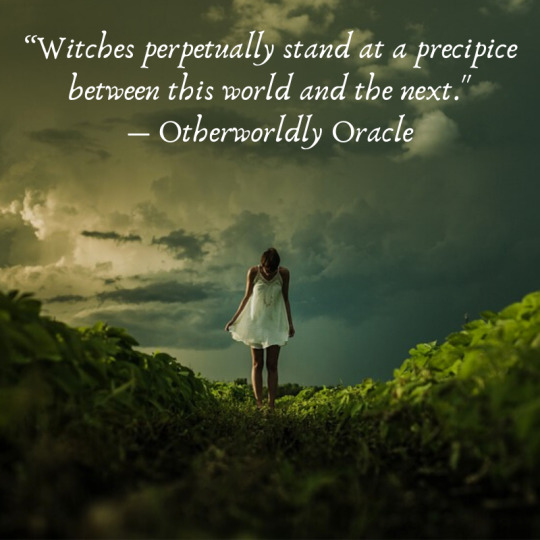
What Are Magickal Liminal Spaces?
Magickal liminal spaces are a type of spiritual liminal space that is unique to each practitioner. These magickal liminal spaces are personal times of power when the veil between worlds is thinnest for the practitioner. Moreover, the practitioner feels at their most magickally potent during these liminal times as their ability to weave magick in multiple dimensions flows with more ease than other times. How can you decipher your magickal liminal spaces? Well, it’s actually easier than you may think. Sit down with a pen and paper and record when you feel most magically in tune including:
Times of the day by the hour – 9AM, 5PM, 12 midnight
Times of the day by category – dawn, midday, dusk, night
Days of the week – Wednesday, Saturday
Months of the year – September, July, December
Seasons of the year – Autumn, Summer, Winter, Spring
Cardinal directions you work in – South, West, North, East
Elements you work best with – Fire, Earth, Air, Water, Metal, Wood, etc.
Moon phases/Esbats – Full, New, Waning, Waxing, Dark
Astrological seasons – Pisces, Virgo, Leo, Taurus, etc.
Sabbats/Holy Days/Holidays – Mabon, Yule, Beltane, Midsommer
Recording your affinity in each of these categories will help you zero in on your best times to work magick because during these times, the veil will be thinner for you. I am sure I have left something out but if you think of another category, feel free to add to the list!
Witches, Liminal By Nature?
Witches, by their very nature, are drawn to liminal space whether physical, spiritual, or personal. Most of us have been on the fringes, or downright outcast, from society for one thing or another in our lifetime. Many of us have experiences this just by being authentic and claiming our power through the use of the Witch signification.
The vast majority of a witch’s work exists between worlds. Some examples of liminal practices include things like:
spirit work – mediumship, possession
divination – pendulum, cards, tea leaf reading, palmistry, etc.
casting spells – anything requiring manifestation and intention
invocation of deity – asking a deity to fill your space with their presence
ancestor work – asking for help from your ancestors
energy healing – reiki
These practices are all spiritual liminal spaces sacred to practitioners of magick. There are witches who define themselves as Hedge witches. This means they only practice in liminal spaces or practice in liminal spaces roughly 98% of the time.
However, if you’re involved in witchcraft at all, I can guarantee that you have spent time in liminal space. It is in the between where we can commune with spirit and otherworldly beings, preform energy work such as reiki and other healing methods, revisit past lives to heal personal trauma, and the list goes on. The point is, we do A LOT in the between whether we realize it or not.
Now it’s your turn to think about it. What liminal spaces have you occupied in your lifetime and what liminal spaces do you occupy now?

https://otherworldlyoracle.com/liminal-spaces-spiritual-magickal-personal/
0 notes
Text
Lost Light, the Moon, Fairy Tales and the Unicycle Man
I find it remarkably suspicious how…central Kaput has been to so many problems, this issue, and the fact that he’s apparently dead at the end doesn’t make me any less suspicious about the whole damn thing. A lot of this is off the cuff, throwing ideas at the wall to see what sticks, so take it with a grain of salt, but…
(LL #7 spoilers abound)
But first? Two not very quick tangents.
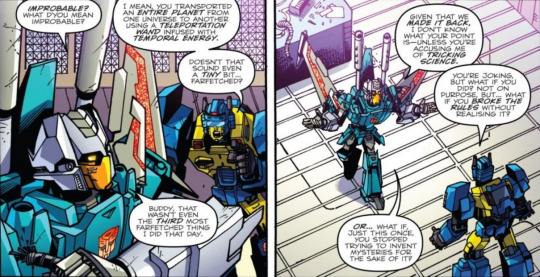
Tangent one. Improbable and farfetched, tricking science, breaking ‘the rules’ of inter-universal physics - fun times! This is a massive red flag to me that the comic is very aware that things have gone awry since we transitioned from MTMTE to Lost Light. Something extremely suspicious is afoot and has been from the moment the art style changed and I think Nightbeat is entirely right that we shouldn’t trust all this.
Something to keep in mind: Brainstorm figured out how to teleport everyone back from the Functionist Universe by bringing Swerve back from Killmaster’s universe-defying wand space pocket. And Swerve was the one affected by Brainstorm’s meta-bomb. The last time Swerve was emotionally overwhelmed and suicidally depressed, he found his ‘happy place’ on Swearth, breaking the fourth wall all over the place and narrating his own actions. Now, he’s taking hits of emotional suppressants in the wake of Skids’s death, and god only knows how that’s interacting with whatever lingering effects there might be from the meta-bomb if it hasn’t really worn off. Swerve and Brainstorm are at the crux of some of the most physics-breaking, meta-awareness heavy points in MTMTE, and the thought of Brainstorm 'tricking’ science and 'breaking the rules’ in this past arc? Right when we know Swerve is emotionally compromised and trying to suppress it? That’s a potent combination.
Tangent the second? 'A teleportation wand infused with temporal energy’ leads me right to this:
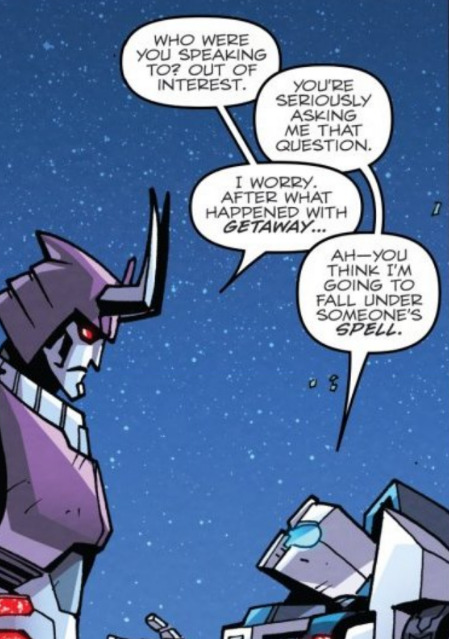
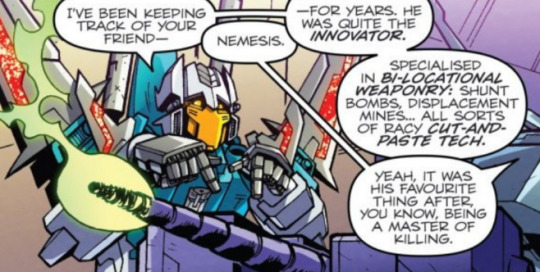
Killmaster brings an almost literal ‘magic’ wand into play. Tailgate uses the phrase ‘falling under someone’s spell.’ And then:

The End. With an exclamation point.
Things are getting fairy tale-esque all up in Lost Light, and the more improbable and bizarre things get, the more I wonder how it’s all going to fall out. Another example of these strangely fairy tale-ish shenanigans - FU!Rung literally turned into a giant the size of fifty Titans to fight the Moon.
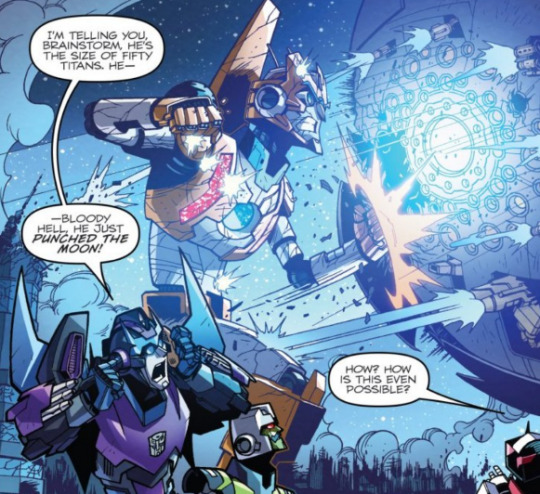
‘How is this even possible?’ It probably shouldn’t be. But time and space and physics in general have been under constant pressure ever since the quantum engines split the Lost Light into two - since Brainstorm made a working time machine - since the meta-bomb went off - since Shockwave fiddled with the space/time continuum - since Megatron started messing with his chest full of black holes - since Censere figured out how to jump through time and space to save people - since the geobomb, based on Killmaster’s tech, went off - and honestly? It just Keeps Happening.
As far as fairy tales go, I’m trying to draw thematic connections to Luna-2 (though that’s a little more speculative on my part) because Killmaster’s specialty is copy and paste, bilocational weaponry and his moongun plans were supposedly the basis for the geobomb that sent everyone to the Functionist Universe in the first place. His magical wand can ignore or actively manipulate inter-universe physics and reach between the universes apparently effortlessly.
The only vaguely relevant fairy tale concerning moons that I’ve found in a quick search is the Buried Moon - the moon is buried/trapped under a stone after helping a man, and the world is dark at night with the moon absent so that evil things are free to roam at will until she’s found and freed.
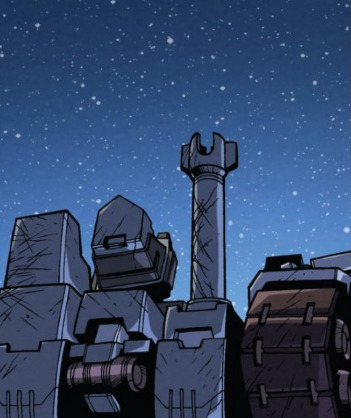
Which is not only alluded to by Megatron staring up at a Luna-less sky in the Functionist Universe, but also by the fact that Brainstorm teleports Luna-2 inside the hollow Necroworld, burying it. Then to top it all off, we end LL #7 with Tailgate buried under the ground, with a very fairy tale-esque ‘the end!’ to round out the issue.
(It’s also possible to link Tailgate’s plotline to Sleeping Beauty - the princess is cursed to fall asleep for ~100 years, etc, while the castle is surrounded by brambles and thorns, or Snow White - sealed away in a glass coffin. Having flowers grow over your 6 bazillion year tomb is again a stretch, but still…troubling. These fairy tale allusions, even the ones that are a stretch, worry me a lot.)
Finally - back to Kaput, and why I think he’s part of the fairy tale problem.
While Fangry might exacerbate the issue, he’s not the one who talked Tailgate into a hole in the ground to magically solve all his problems.
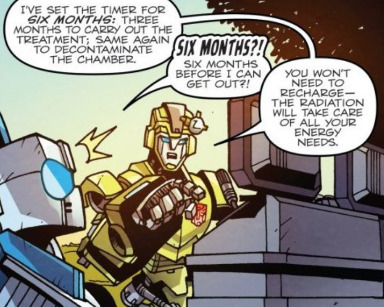
The instant Cyclonus is gone, Tailgate starts listening to Kaput - instead of, you know, also consulting Velocity or Ratchet, aka the two more familiar doctors around him. And he winds up buried alive on a planet of the dead, a planet that was the mold of Cybertron where Tailgate was buried and forgotten originally.
Being dead doesn’t clear Kaput from suspicion for me because he keeps showing up hip deep in everything, when Ratchet and Velocity are literally right there to do the doctor thing and yet keep getting sidelined all through LL #7.
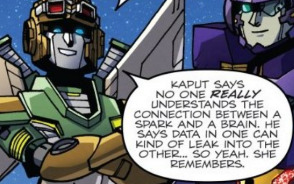
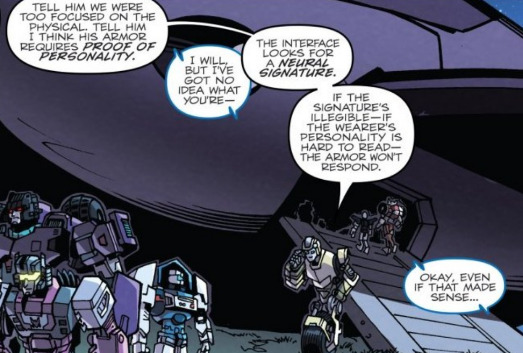

Kaput says this. Kaput says that. Kaput is the one everyone consults for spark related stuff. Which makes sense, since he’s the magical spark flower guy who conveniently arrived just in time to help with all these spark flower problems with Anode and Lug!
And…he also makes optic eyepatches? For Nautica’s optic, which when we last saw it was perfectly intact compared to the rest of her damaged face…which was also repaired. Why an eyepatch, and why now? Kaput also scans the Magnus armor and determines it needs some kind of proof of personality connection? Uhhh…why are you involved in all this, unicycle man?!
(Yet another tangent: one of the last times we had explicit personality related dissonance, Swerve split into three mental personas. Again - I am CONCERNED ABOUT SWERVE. The fact that Minimus Ambus is apparently forced to regress back to his black and white legal pedantry, now that the shades of grey that having Megatron aboard introduced to the Lost Light and the balance he brought to the command team have been banished along with Megatron to the Functionist Universe, is immensely troubling, and definitely something to unpack. We saw Minimus out of his armor the most during Megatron’s tenure on the Lost Light, so that he was more free to be himself rather than hiding in the Ultra Magnus suit/persona, and the fact that he’s trapped in the suit until he’s provoked into regressing by Rodimus is ominous. He literally can’t take it off himself or even move.)
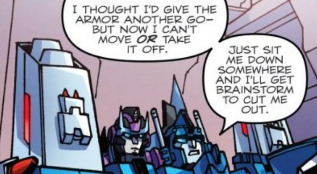
But to kind of wrap up my point about Kaput - Tailgate quite literally asks him for a happy ending.
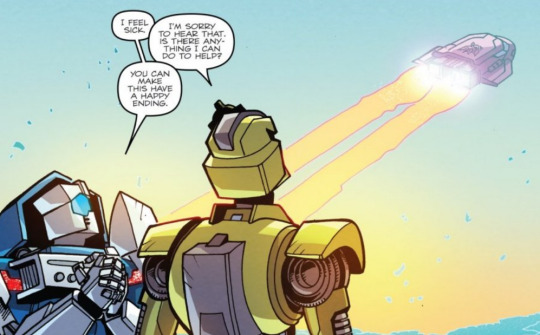
Let’s not forget that the word kaput means 'broken/useless’ - when we’re just coming off an arc about Functionism, and the Useless One(s).
Between the spells, the magic wand, and the wish for a happy ending, I really don’t know what to make of it. But Kaput kept showing up to solve people’s problems throughout the issue even when it made little to no sense for him to do so, right up until the moment Fangry seemingly kills him and condemns Tailgate to a (hopefully temporary) stint in a radiation tomb version of Sleeping Beauty.
And I don’t trust the unicycle man. Whether he’s some kind of instigator, or just a symptom of a larger problem with the Lost Light crew trapped in the liminal space of a fairy tale, I don’t like it.
#lost light spoilers#transformers#maccadam#mtmte#lost light#and thus did Tailgate's thorny prince fly off into the sunset#somehow my cut got removed when i edited this on mobile goddammit
146 notes
·
View notes
Text
Notes on The Argonauts
I finished reading Maggie Nelson's The Argonauts (2015). One down on the list of books I've set out to read this summer. It will very likely be the easiest of them all, I had no intentions for this one.
I heard The Argonauts mentioned a few times by peers, I even had parts of it assigned in class, but I never bothered to look into it properly. I knew at a glance at a professor's scan that I liked the way Nelson incorporates quotes into her writing. I've always hated formal citation, cutting up my sentences with information. I also don't like compromising on others' ideas. If I could write only in a collage of block quotes, I would. I'm glad someone finally stuck it to them.
It's Bluets I had actually intended to read, perhaps for silly reasons. First, simply because it wasn't The Argonauts, second because I like it when people have a thing and I thought the colour blue might be a thing, and third because the blurbs I skim-read announced a mix of prose and verse, which, in my experience of Anne Carson, is a great thing.I ended up with The Argonauts just because I wandered into a book store on a lousy day last month to indulge (a small few times a year I let myself buy a book new: on lousy days, or when there's really nothing else to go around). It was displayed right across the entrance. The shop had some kind of watery theme going. This edition has blue-purple waves for a cover, it's nice and simple. I did what I always do: opened to a page at random and gave it a glance to see if it looked palatable. There were lines of verse (good), they were about motherhood (this I wasn't so sure about, felt uneasy even). Either way, I walked out of there comfort-book under arm, without knowing anything about Maggie Nelson except her name, and completely forgetting about Bluets.
I leave a trace in my books, so I can find my way again. The folded corners at the top tell me at what pace I read. The ones at the bottom tell me where I wanted to remember something the most. For Argonauts ,I tacked on a few other things: some blue post-it notes for further readings, three exactly, various pencil annotations, and a few words scribbled in the margins.
I know I will came back to The Argonauts. The books I seem to refuse to preview properly are always such a surprise. I had that happen with The Bell Jar. I was 18 and had absolutely no idea what it was about and knew nothing about Sylvia Plath either. I was reading quite a few classic American novels that year (I know Why the Caged Bird Sings, To Kill a Mockingbird, The Catcher in the Rye, Post Office, Fahrenheit 541, Brave New World, Lolita etc.) and, given such a list, the Bell Jar could land pretty much anywhere in terms of what it was about. For some reason I had it pegged as something pastoral, perhaps Southern, and coming of age. My guess is Plath's gender amongst all the men had me lump it with Maya Angelou and Harper Lee. Nonetheless, the modernity of it, the content of it, the sincerity of it... hit me like a ton of bricks. Argonauts didn't have quite such a jarring effect, but it was a definite experience in the un-anticipated.
I've spoken to a few girls my age about the strange turn some things appear to have taken in recent years. No one thinks to warn you. It suddenly dawned on me one day that pregnancy was something that I couldn't quite get in trouble over anymore. For the longest time accidental pregnancy just had this death-factor reaction of "I'd be completely fucked". It meant shame, it meant secrecy, it meant incredible burden if uttered. But somewhere in the midst of my extended family growing larger – older cousins and siblings making babies – it struck me that mothers (my mother, my aunts, 'my many-gendered mothers'), that is the gyroscopes of opinion and permissibility, were anticipating the emergence of a new generation of care. Hints are dropped in the form of stored children's books and stuffed animals – carefully, quietly, pragmatically kept. A tattoo artist warned me about places not to get tattooed. It is my responsibility to anticipate my body. The irony, and I love it all the more for it, is the tattoo I have of my family motto: nunquam non paratus, or never unprepared.
It's from this strange perch – discovering what it means to be a fertile body in the eyes of others, and tentatively in my own – that I read The Argonauts. It is also from a place of naming and recognising, for the first time realistically, what ordinary devotion to someone means. I know this book is a valuable reading, but I'm aware of my own prematurity. I can anticipate the need to return to it, for whichever reason, and I know the next times will be different.
For now, I've gathered some passages that struck me now, as I feel, as I was reading, as I am writing. They might seem oddly selective, but I think this is only a sign of how versatile The Argonauts is. In its richness it offers a multiplicity of readings (and I feel sure its generosity of quotes have just this purpose).
Here are the lessons I gathered from Nelson and from those she speaks through:
Writing:
"As I labor grimly on these sentences, wondering all the while if prose is but the gravestone marking the forsaking of wildness (fidelity to sense-making, to assertion, to argument, “however loose)—I’m no longer sure which of us is more at home in the world, which of us more free.” (65)
"What other reason is there for writing than to be traitor to one’s own reign, traitor to one’s own sex, to one’s class, to one’s majority? And to be traitor to writing.” (Parnet, 122)
"Over the years I’ve had to train myself to wipe the sorry off almost every work e-mail I write; otherwise, each might begin, Sorry for the delay, Sorry for the confusion, Sorry for whatever. One only has to read interviews with outstanding women to hear them apologizing.” (Wittig, 122)
"Writing to him felt akin to giving him a name: an act of love, surely, but also one of irrevocable classification, interpellation.” (175)
I've been thinking for a while now about an act of naming and how names arrest things in flux. Also, see Anne Carson's introduction to Autobiography of Red.
"Ordinary words are good enough." (25)
“What exactly is lost to us when words are wasted? Can it be that words comprise one of the few economies left on earth in which plenitude—surfeit, even—comes at no cost?” (Carson, 60)
"You know so much about people from the second they open their mouths. Right away you might know that you might want to keep them out. That’s part of the horror of speaking, of writing. There is nowhere to hide." (Myles, 121)
I concur, writing is horrifying.
I've also learned that writing can be wilted (129).
"I gained an outsized faith in articulation itself as its own form of protection". (154)
Gender/sex/binaries:
"As if I did not know that, in the field of gender, there is no charting where the external and the internal begin and end—" (64)
"How does one get across the fact that the best way to find out how people feel about their gender or their sexuality—or anything else, really—is to listen to what they tell you, and to try to treat them accordingly, without shellacking over their version of reality with yours?" (66)
"Let him stay oblivious—for the first and last time, perhaps—to the task of performing a self for others, to the fact that we develop, even in utero, in response to a flow of projections and reflections ricocheting off us. Eventually, we call that snowball a self (Argo)." ( 118)
In-betweenness:
Matter and liminality are two of my research topics. It's been so pleasing, uncanny, to see them flit in an out of sight. It's really what this is about: being, becoming passage.
“How to explain, in a culture frantic for resolution, that sometimes the shit stays messy?” (65)
“On the one hand, the Aristotelian, perhaps evolutionary need to put everything into categories—predator, twilight, edible—on the other, the need to pay homage to the transitive, the flight, the great soup of being in which we actually live. Becoming, Deleuze and Guattari called this flight: becoming-animal, becoming-woman, becoming-molecular. A becoming in which one never becomes, a becoming whose rule is neither evolution nor asymptote but a certain turning” (66)
Matter:
"Spirit is matter reduced to an extreme thinness: O so thin!” (Emerson, 41)
"Empirically speaking, we are made of star stuff. Why aren’t we talking more about that? Materials never leave this world. They just keep recycling, recombining. That’s what you kept telling me when we first met—that in a real, material sense, what is made from where." (151)
"Made of star stuff" reminds of Nostalgia for the Light. I think it's the first time I understood space as a material history. Dust to dust and all that.
Argo-, ordinary devotion, revisiting:
"It reminds us that there is difference right where we may be looking for, and expecting, communion." (116)
The year I fell in love with theory, theory of all kinds, even though this course was called "anthropological", I was assigned 'difference' as a theme to explore for one semester. I hold onto the word dearly now, because it has so much to teach. Now I hear the word "difference" and it makes me think of Deleuze in a purple jumper, slouched in a chair, talking about refrains. Deleuze taught me about communion too. What it means when two refrains commune, when two different scales encounter each other. Anthropology is all about encounters. Encounters are only possible with difference, however large or small. A zine called Friendship as a Form of Life, which is as beautiful as its title sounds, divided its pages into the following chapters: Common, Commune, Communion. I think about this sequence a lot.
“The Argo’s parts may get replaced, but it’s still called the Argo. We may become more used to jumping into flight, but that doesn’t mean we have done with all perches. We ought to say a feeling of and, a feeling of if, a feeling of but, and a feeling of by, quite as readily as we say a feeling of blue or a feeling of cold. We ought to, but we don’t—or at least, we don’t quite as readily. But the more you do, the more quickly you can recognize the feeling when it comes around again, and hopefully you won’t need to stare as long.” (68)
Hello from my perch.
"Privilege saturates, privilege structures."
"The self without sympathetic attachments is either a fiction or a lunatic…. [Yet] dependence is scorned even in intimate relationships, as though dependence were incompatible with self-reliance rather than the only thing that makes it possible." (Philips/Taylor, 126)
I am learning this.
"That’s enough. You can stop now: the phrase Sedgwick said she longed to hear whenever she was suffering. (Enough hurting, enough showing off, enough achieving, enough talking, enough trying, enough writing, enough living.)" (128)
Yes, I can stop. Please stop. I'v been spiralling a little lately.
"But whatever I am, or have since become, I know now that slipperiness isn’t all of it. I know now that a studied evasiveness has its own limitations, its own ways of inhibiting certain forms of happiness and pleasure. The pleasure of abiding. The pleasure of insistence, of persistence. The pleasure of obligation, the pleasure of dependency. The pleasures of ordinary devotion. The pleasure of recognizing that one may have to undergo the same realizations, write the same notes in the margin, return to the same themes in one's work, relearn the same emotional truths, write the same book over and over again—not because one is stupid or obstinate or incapable of change, but because such revisitations constitute a life." (140)
This quote means so much to me at this particular time: as I cease to recognise myself, as I come undone and remade (argo-), as I learn what it means to feel so easily, to be so ordinarily devoted to someone. I was so ready to feel confused about questions of loss and gain, whether it was something to feel self-conscious about, to lose oneself to, or to rebel against. But the pleasure is simply what it is. It seems so obvious that I feel naive. Of course it's about the knowing itself, about matter and touch. It's always about what hangs in the air. I have someone to learn ordinary devotion for and the shock of this is still wearing off. I thought of it as a thawing at first, but 'to revisit' will be my mantra instead. Revisit, revisit, revisit. I am not gone, I am not new, "I am made and remade continually". (Woolf)
"But is there really such a thing as nothing, as nothingness? I don’t know. I know we’re still here, who knows for how long, ablaze with our care, its ongoing song." (178)
Refusing the nothing has been part of my venture these past months. It started with Elizabeth Povinelli's suffix "-ish", and all other blurring of boundaries, like between the living and non-living. Tim Ingold also refuses the nothing of atmosphere. Nelson's quote brings me back to communion: line-making, care, drifting, song-making, correspondence.
Mother:
"If all goes well, the baby will make it out alive, and so will you. Nonetheless, you will have touched death along the way. You will have realized that death will do you too, without fail and without mercy. It will do you even if you don’t believe it will do you, and it will do you in its own way. There’s never been a human that it didn’t. I guess I’m just waiting to die, your mother said, bemused and incredulous...” (167)
"But to let the baby out, you have to be willing to go to pieces.” (155)
"It's a happiness that spreads." (176)
"...save the sense, likely unconscious, of having once been gathered together, made to feel real." (176)
The things I want to look further into:
André Breton's Mad Love
Deleuze/Parnet dialogues
Barthes' The Neutral
(No, my francophilic tendencies are not getting any better).
1 note
·
View note
Text
Liminal: The Binondo Phenomenon
By Charlene Enriquez
There’s always that weird in-between period in your life; like being a teenager, when you’re transitioning from child to adult. You realize that you don’t quite fit in your local playground, the swings are a bit too small or the seesaw too close to the ground -- but you also can’t enjoy recreational adult spaces like bars because you don’t quite fit in that scene also. It seems like the strings that guided you to act a certain way was abruptly cut off, and you must re-learn how to act again. This limbo is called a “liminal space”, a concept of “crossing over”, creating the feeling of having left something behind but you are not fully in something else. If you convert that phenomenon into a place, it would definitely be Ongpin, Binondo. It’s a confused mishmash of distinctly Chinese memorabilia shadowed by a flurry of Filipino conceptions.
Chinese red lanterns are strung all over the place, Chinese characters are present in signs and logos of establishments, and shops sell unique products of herbal medicine with inscrutable Chinese instructions. This is undercut by a huge Catholic cathedral where hundreds of Filipinos attend mass weekly, a number of eateries which sell Filipino viands and desserts, and vendors who sell fruits from our islands. The population is composed of Filipino-Chinese citizens -- Chinese-looking with accented Filipino tongues yet still know the ins and outs of Manila like the back of their hand. Of course, not everyone in the area is Fil-Chi; the people in the community have a huge number of Filipinos who aren’t distinctly mixed with Chinese blood. The whole place looked like a collision of two worlds -- like it doesn’t really know what it wants to be and it just happened to evolve into this creature of coalescing cultures.
We travelled to Ongpin on a jeep in a group of four. It was midday when we went down in front of Binondo Church, also known as the Minor Basilica of St. Lorenzo Ruiz. The area near its entrance was occupied by people in poverty: an old man with welts on his face asking for alms and a mother coaxing her three small kids playing with coins and sticks. The inside of the church was a stark contrast to the outside. Inside was a huge cavern, with a high ceiling supported by tall posts, creating wide arches. Images of heavenly glory covered the ceilings, atop the multi-colored metal chandeliers. A different kind of poverty permeated the people inside -- young and old men and women kneeling in fervent prayer by the pews, some standing by the Nazareno icon, others in line at the candle-lighting area to pray for their intentions. After saying our prayers, we took our exit to finally embark on our Binondo adventure. On the left and right of the Church were streets snaking into Chinatown behind it. Unsuspecting vehicles zipped past the Church, unaware of the hidden world behind it. We started our journey by entering the street at the Church’s right side, Ongpin St.
Our first stop was the Dragon Phoenix Enterprise, a shop selling an assortment of charms, gemstones, and golden statues of army generals, gods, and dragons. The pathway to the entrance was cluttered by figurines, Feng Shui books, and charms dangling by the doorway. The inside was even more stocked: with shelves after shelves of these goods. On the walls were calendars listing the different years of the Chinese Zodiac, with information on how one’s animal sign affects the wealth, relationships, and overall luck this 2019 Year of the Pig. Beside the glass case of gemstone jewelry were paragraphs explaining the “powers” of the gemstones -- bracelets that give good luck when gambling, enhance fertility or protect the wearer from danger. All in all, the shop was swarming with these items, leaving frustratingly narrow aisles in between shelves. We had to line up and enter the aisles one by one to get a proper look around. We also had to be very mindful of the space we take up, with figurines one elbow nudge away from tipping over the entire store. This shop aiming to sell Feng Shui-approved items was ironically cluttered, had dim lighting, and generally left no space for good luck to roam in -- an affront to Feng Shui principles. Maybe that’s the appeal of the place; that it doesn’t pretend to be the paragon of spiritual enlightenment, but still does enough to show it knows some things. A perfect in-between of the temporal and spiritual world. It doesn’t know whether it’s a treasure chest of good luck and prosperity or a stockpile of make-believe magical items. (Or maybe it knows but doesn’t really care.)
Exiting the shop, we were hit by the blazing noon sun, signalling the height of lunchtime. Relieved to finally be free from that cramped shop, we roamed around the dizzying streets of Ongpin that had restaurants everywhere. After being paralyzed by the amount of choices, we finally settled with Estero Fast Food, a karinderya right next to -- you guessed it -- an estero or canal. A short stairway led into a sort-of tunnel which housed a few eateries. Despite the dull concrete floors and, frankly, disgusting environment (I mean, it was right next to a canal…), it was surprisingly not unappetizing. A chain-link fence separated the canal from the area, and strung on the fence were potted plants. There was no smell either and the store booths obscured the view of the canal. The Estero booth displayed assorted raw meat on bowls: chicken, pork, beef, even salmon. The menu was expansive and more importantly, the prices were student-friendly! We ended up ordering salt and pepper chicken, beef with broccoli, shrimp with oyster sauce, and yang chow rice. The four of us only spent a little less than 200 pesos each for all that! The servings were huge enough for all of us (there were even leftovers), the meat soft and bursting with flavor. It was a hearty meal straddling the line between Filipino and Chinese karinderya cuisine, eliciting a full and cozy stomach.
A meal is not complete without dessert, and so we went on the hunt for Ongpin’s trademark mango sago. We asked two restaurants if they had it, only to be disappointed that there was none. We trudged on under the heat until we finally saw the famous Salido Restaurant! We excitedly hurried to the second floor where it was nestled and encountered creaky wooden steps and dim overhead lighting as if we were entering an abandoned place. The interior was quite old-looking. A tiled bar counter straight from the 80s, a supposedly white floor that’s now yellow due to age, and chipped wooden round tables taking up majority of the spacious restaurant. The aircon was broken, plus the TV and speakers seemed like they’ve been unused for a long time. At first glance, everything seemed drab because the slight yellowish tint in the lighting covered the place with a nostalgic sepia glow. The windows were tiny and few, so it was hard to tell what time of the day it was. It felt like a place your grandparents would describe as their hangout spot; like it was stuck in the past, withering away but still alive.
Interestingly, the store was filled with balding old men with their wives and a few adults (perhaps their children); we were the only young people in the shop. Most tables were exclusively old men. They were eating light meals with tea or coffee, conversing with each other. Maybe they were talking about their businesses or their grandchildren or the old days. (Old people love talking about that.) In contrast, the waiters and staff were pretty young and had smiles on their faces. Once our mango sago arrived, we asked the lady waiting on us about the history of Salido and she pointed us to the corner of the restaurant where an adult man was sitting alone, his framed eyes keenly trained on his phone. He apparently owned the place. He looked a bit intimidating, seemingly busy with his brows knit together. The lady just laughed and told us he’s kind. We gulped down the mango juice and sago. Truthfully, it was less sweet than I expected but that was probably because a lot of customers are old people. Afterwards, we approached the owner and introduced ourselves. He made us sit at his table and he was pretty warm towards us, letting go of his iPhone X once we joined him. His name was Arthur King, and he gave each of us his calling card as an introduction. He spoke to us in Filipino, with a lightly noticeable Chinese accent. He wasn’t that old; probably in his fifties. Once we’ve settled down, he jokingly asked if we were from the BIR asking about sales. We assured him we weren’t and proceeded to ask about his store and the history surrounding it. He launched the story of how his lolo set up Salido, originally a small turo-turo karinderya which eventually expanded into a restaurant. After World War 2 damaged his karinderya, it was rebuilt in the place where it stands now and continued to flourish, staying strong until today. Once we asked about his customers, he leaned forward and started to excitedly point at different people in the shop. “Ayan, may-ari siya ng Ace Hardware at ka-batch ko dati sa school. ‘Yung nandoon sa likod na natutulog? Jusko, lagi ‘yang nandito noong bata yan! Tumatambay at naglalasing dito hanggang gabi at may dala-dalang mga girlfriend!” He knew almost everyone and excitedly recounted each one’s story to us. He even bragged about Erap and Atienza being regulars as well, advising us to come by every Sunday if we wished to see them. Salido was indeed a place of the past stuck in the present. Arthur King and his friends (his knights at Salido’s round tables) willfully stuck around in the limbo of Salido, enjoying the last reminders of their young days with their old friends.
We left the store and saw that it was almost 4 in the afternoon. Time goes by faster when you’re in Binondo, I guess. We found our way through the labyrinth of streets, and finally found ourselves back at Binondo Church; this time, emerging from the opposite side of where we entered, the left-side Norberto Ty St. We went full circle and now we were back to the regular view of zipping jeepneys and fast-paced walkers, consumed by concerns of the present. Binondo gave us a needed break as we explored the mysterious behemoth of in-betweens. The in-betweens of Filipino and Chinese cuisine, of the spiritual and temporal world, and of the past and present. Different places with different purposes, but all under the same Binondo phenomenon. Visiting the places, it is evident that it doesn’t quite fit in both Filipino and Chinese cultures -- it’s like you left Manila but you’re not fully in China. Lost souls are sure to find a place amidst the dysphoric Binondo (and only for a few bucks).
Gallery: https://cnfhumss12a.tumblr.com/tagged/Charlene
0 notes
Text
2016 Individual Project Grant: Examining the physical, social, and emotional borders of First Nations reserves
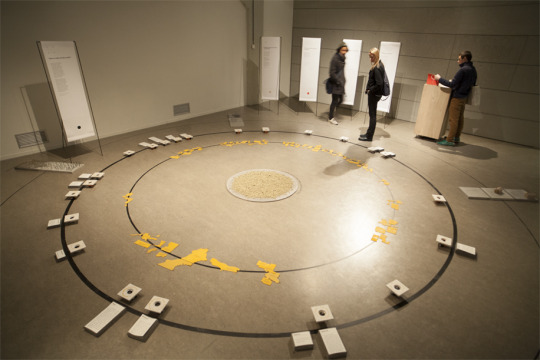
Marina Hulzenga grew up in the southwest woods just outside the Edmonton city border by the Enoch Cree Nation reserve, which is where the connection for her project LIMINAL SPACE || AWASITIPAHASKAN began to take shape. Hulzenga studied exhibition design at MacEwan University, and eventually moved across the pond to attend grad school in the Netherlands, specializing in Public Space Design. For her final thesis project, her fascination with place and space came full circle, bringing her back to the Enoch landscape where she was raised. “They were my neighbours my whole life, and I never really knew them,” says Hulzenga. “Even as a young child, I sensed it was another place, another world I knew nothing about. At school we were taught about the history of First Nations in Canada, but nothing about this place.”
The first phase of LIMINAL SPACE || AWASITIPAHASKAN was completed in 2014, exploring the borders of First Nations reserves in Alberta on multiple levels: the physical borders, social borders, and emotional borders. Liminal space is defined as “the space of a threshold from one domain to another,” and Awasitipahaskan means “across the border line” in the Indigenous language of Cree. With support from an Individual Project grant, Hulzenga hopes to expand the project. As Hulzenga describes it, “my focus was on the borders of the landscape, which revealed five different types of boundaries. From there I explored each border and how it could be communicated within a book and exhibition format. The final objective of that project was to create a space for conversation. To talk about these borders and ask: what do they mean? Why were they created? How do we use them? Do we still need them? It was not about proposing what is right or wrong, but about illustrating an objective perspective of the landscape.”


As one method of visually representing reserve borders, Hulzenga captured the ground itself in tiles that mark the change from gravel to pavement. The idea initialized from a conversation with Paulina Johnson while driving down the gravel roads of the Saddle Lake Cree Nation reserve. “There was one section where the road was really rough, and I commented, ‘whoa, these reserve roads.’ She smiled and softly said, ‘driving on gravel roads makes me feel home,” recalls Hulzenga. “It really struck me, this simple and beautiful comment. Gravel is such an unassuming, and barely noticed material, and for her it was a symbol of home.”
While working on the project, Hulzenga noted that almost every reserve has gravel roads, where the surrounding provincial roads are all paved with asphalt, creating a border in a very subtle way. “I continued with the idea of these two materials meeting each other, and how that transition occurs at the edge of a reserve.” While displaying the material change as a concrete tile, viewers are able to interact on a tactile level, as a surface they can move across.
Another primary component of LIMINAL SPACE || AWASITIPAHASKAN is the creation of reserve forms cut out of deer hide that visually depict the different contours of the borders. For the first half of the project, Hulzenga managed to capture the shapes of 86 reserves, and with the continuation of the project she is looking to capture the remaining 54. The project required a fair amount of investigation on behalf of the artist: due to the fact that many reserves are not captured on traditional maps, Hulzenga patched together the information using a list of names, locations, and Google maps. Deer hide was chosen specifically as the medium as it speaks to the idea of cutting a shape out of the landscape – cutting a shape out of the people. As a material traditionally used by Indigenous peoples for constructing clothing and shelter, the medium grounds the shapes with a sense of the people.


Hulzenga also plans to expand her exploration of reserve forms by translating the shapes into different materials to see what these translations could communicate. “This particular story, of the deer hide, is a conversation about the dividing and cutting of the landscape. If these shapes were translated into concrete, or ceramics, or textiles, what would they say then? I would like to listen and hear if these forms have more to share.”
The final major component of LIMINAL SPACE || AWASITIPAHASKAN is to expand upon the lexicon of definitions. This border is about language, and illustrates Hulzenga’s observations about the words and definitions used in conversation with individuals living both on and off the reserves. She noticed that on multiple occurrences, similar words were being used, but would mean different things across the two groups. “Judy Half from Saddle Lake Cree Nation reserve is the Aboriginal liaison at the Royal Alberta Museum. Judy inspired this border because of her definition of the word: artifact. She related to me that the word artifact is not a term her Indigenous Cree community would use, because it insinuates that the object is dead. It institutionalizes the object, storing it on shelves and in drawers. But for many Indigenous people, and the cultures these objects belong to, they are far from dead. Holding very different truths towards their objects, these cultures see their objects as having life.”
Paying extra attention to diction choices and the associated definitions, Hulzenga reviewed her interviews and picked out an assortment of words and definitions that kept repeating. The words and definitions used by Indigenous and non-Indigenous people were placed side by side to illustrate the similarities and differences. It’s about the space between these two definitions. By the end of the project term, Huzenga hopes to compile a larger and more diverse collection of definitions and conversations about the words we use, and what we mean to say when we use them.
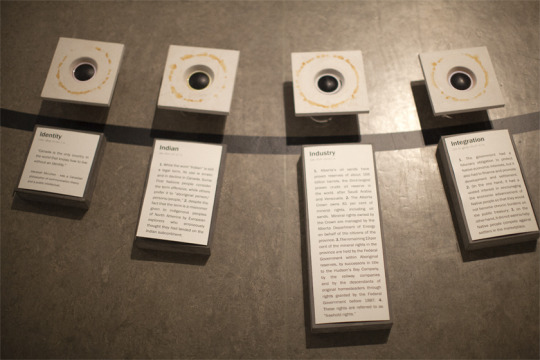
After all is said and done, Hulzenga anticipates the second phase of LIMINAL SPACE || AWASITIPAHASKAN will be completed within a year. When the future exhibition is open to the public, Hulzenga hopes her work will help people become more aware of the spaces around them. “As a spatial designer it’s something I’ve become in tune with. People are often unaware of what’s around them. There are actually borders everywhere, and we have created them. Why do these borders exist? Who built them? What does it mean to live with these borders around us? There is an extensive conversation about borders going on. It’s a global conversation, and a very timely one. So let’s talk about it!”
24 notes
·
View notes
Text
TERRAFORMING BODIES: A BRIEF OVERVIEW
Through this project I intend to explore queer embodiment in music with special attention to the liminal spaces that queer bodies often occupy and the links between this physical embodiment of “in betweenness” and liminality in music. I intend to create a series of songs and short instrumental fragments with the potential to be presented in a mixtape format. I hope to explore liminality through ambiguous instrumentation and production, avoiding genre constraints, contrasting direct and indirect approaches to lyricism and treatment of vocals.
This project is inherently personal, as I was inspired to create it by the language which surrounds my existence as a transgender person and how that affects the way I view my body and life as in a constant state of transition. Having been receiving testosterone injections for slightly over a year and continuing to wait for surgery from the NHS my body does not and will not for a long time, if ever, be fully aligned with cisgender men. Until very recently I wholeheartedly wished I was a cisgender man, I still do a lot of the time, because quite simply my life would be significantly easier and more comfortable. I would not suffer from mental health issues caused by my dysphoria, I would not feel uncomfortable around people I don’t know for fear of being misgendered, I would not have to deal with false representations of my community in the media, I would not have to trudge through bizarre bureaucracy to be recognized as a man and I wouldn’t fear the possibility of discrimination or violence motivated by my identity. At this point in my life, though I am a man and I know that, my body does not reflect that and there are no terms to describe my physiology which respect me as more than a work in progress, as something waiting to be normal. I want to feel that the person I am now is more than something to wade through and wait for better.
Jack Halberstam’s discussion of queer space and temporality in “In A Queer Time and Place” (Halberstam, 2005) highlights some of the key concepts I wish to discuss and explore through my music. In the first chapter he explains how western middle-class notions of respectability revolve around allocation of specific times of life to specific ways of living which are not always comfortable areas for queer people to reside within. For example, the notion of reproductive time; which is ruled by the body and the social implications of having a child within wedlock at a specific time of your life is an unachievable and undesirable life choice for most queer people. Therefore, queer lives cannot exist within the same temporal mindset, we must view our time in different ways and develop spaces and practices which are fulfilling outside of straight cisgender time frames. If we accept that the framing of our existence by markers of maturity through capital preservation, nuclear biological ideas of family, notions of wider productivity and the emphasis on health and longevity within these timeframes affects the way we view time both consciously and subconsciously, I argue that the socially and physically transitioning transgender subject must exist in a separate temporality.
When cisgender people arrive in their early twenties they have reached their final stage of physical growth, although obviously bodies change over time through weight and muscle fluctuation, body modifications and cosmetic surgeries; these rarely compare to the amount of change that medically transitioning transgender people experience through their adult lives. I think it is interesting to try and explore how this may affect how we view the trajectory of our lives in comparison to our cis counterparts.
How I would like to apply these ideas to my music was inspired partly by an essay written by Drew Daniels called ALL SOUND IS QUEER. (Daniel, 2011) In this essay Daniels talks about the inherent queerness of sound, as something which “queers the self-world border” in a way that other stimuli do not. In this essay he articulates a longing for queer music which does more than hail the queer subject, telling us “you are queer, this is your music, come and consume” but for queer music to explore the more unusual and subtle sonorities possible, to reflect our existence through a wider approach to the possibilities of sound. One of my favourite aspects of the essay is how he discusses the fallibility of sound to reflect purely what is being recorded, he says “… the recording moment promises to pin its object securely to our ears, but that very fidelity is haunted by the transcendental failure of sound to verifiably align itself with the signs we use to describe it.” I think this failure of sound to align itself with its description is reflected in gender variant identities, the idea that what you see and what you thus believe to be true may not be reflected by the individual’s mind or body.
His advocation for queer musicians to turn away from seeking visibility and representation under a system which often actively exploits us and tokenises our artistic outputs and towards the exploration of sounds which curb definition and connection to source have inspired me to consult more seriously how the instrumentation and production behind my songs affect their meaning.
In response I am creating a number of circuit bent instruments which I intend to use heavily throughout my songs. I have chosen to rely on these circuit bent sounds as I believe they evade definition in a way that the recognisable tone of more conventional instruments do not. This unintelligibility and evasion of definition feels linked to the unintelligible and undefinable biological nature of a body in transition. I hope that through these choices I will be able to create music which reflects my experience of being queer tacitly.
Bibliography
Daniel, D. (2011, November). All Sound Is Queer. The WIRE .
Halberstam, J. (2005). Queer Temporality and Postmodern Geographies. In J. J. Halberstam, In a Queer Time and Place Transgender Bodies, Subcultural Lives (pp. 1-22). NYU Press.
0 notes
Text
Octopus crew. Empowerment through movement.
Agata invited Pauline, Tomasz Vala Foltyn and myself to be part of the panel Empowerment through movement for the Inventur 2, organized by Tanzhaus NRW. The way in which we worked for this panel was equally distributed in terms of decision making. We had long and enjoyable dialogs in which we shared our approach to empowerment, from a place of care and also deep reflection, bringing into the discussion academic references, personal experiences, dreams, hopes, work examples, reading materials, written tasks, etc, to collect information that could lead us to a wider understanding of what the embodiment of empower could mean for us. And one point of agreement was that empowerment implies embodying discourses, bring them into action, into movement.
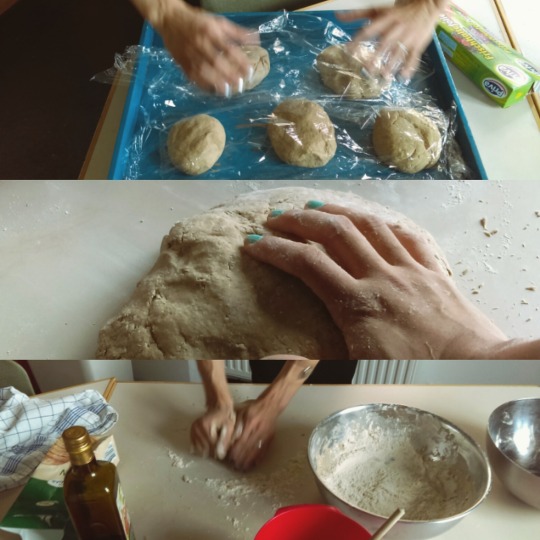
In this sense, I brought the proposition of backing T’antawawas and bread. Which everyone interpret from their own places and practices. For Vala, backing was connecting with his grandparents, and therefore with his roots, because they were backers themselves. For Pauline it connected with the bodily motion of preparing the dough and the understanding of getting things together (discourses, stories, dreams) in the same product. For Agata it resonate in the agency of digestion and how to digest or not, or even being allergic to certain theories. For me backing T’antawawas (bread babies in quechua) was connected with the rituality of preparing a receptacle for something else to inhabit it. In Bolivia, during the Todos Santos (All Saints) festivity these bread babies are backed in order to receive the souls of the dead. Inside the houses, families prepare tables full of the favorite food and drinks of the beloved one and also full of bread and T’antawawas for the soul to inhabit. So, the link I made with this traditional practice in this context, beyond of the consideration of rituals as ancient and therefore decolonial knowledge, was to allow the audience and ourselves to imagine that all the theoretical references, personal stories work excerpts and practices we were sharing, were actually ‘with us’ brought into materiality through this idea of a soul or spirit inhabiting the bread.
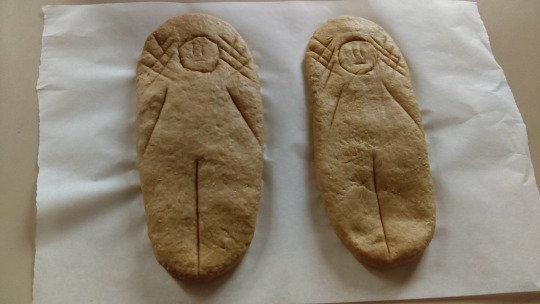
Here I attach what I wrote to be shared during the panel:
We cannot talk about post colonialism. Colonialism is still present in our societies. It is still happening in many ways bringing its side effects that makes me wanna finally get out of this world and the wheel of reincarnation.
Colonialism is inscribed in my life and it shapes my perception. It moves me between the existing classes and says I can exist in the place that was design for me. It dislocates me, it tears me apart, it causes me pain and anger and lots of contradiction. Colonialism still practice the shipping of people’s destinies according to race, class, gender.
How to enact another movement? how to allow a sort of aikido movement to analyze the intricate force that pulls us all in?
I prefer to refer to the term of decolonialism and start from the significative change it proposes in terms of language usage. The de- takes into consideration the existence of something while as the post implies it is over and in this simplicity lies the risk of covering an open wound with dirt, instead of giving fresh air to it.
My language was taken away from me. Native tongues in Bolivia are still connected with the prejudice of being below the master’s tongue, the civilized tongue and the idea of shame towards the place of origin. In order to move from the country side to the city lots of people just want to forget the mother language. So my mom never spoke to us in quechua.
I say ‘ñuqa munanichu’ I love u, and I really have to chew the words so they can stay in my mouth a bit longer but I also would like to pretend it is effortless, the this act of remembering words i don’t say most of the time become something common. Then i take the sensation of something as graspable as the sonority of the voice, the resonance in my whole vocal apparatus as something I can hold on to.
Memory is needed for exercising miracles. There is more than just the act of recalling things, there is the possibility of inhabiting the place to which the memory is bringing us to if we are attentive enough. Body archives sensations, emotions, feelings, traumas, joys, sickness, abandonment, and lost languages. What portion of me keeps the ability of articulate a word in quechua? what part of me is willing to look after the pieces of it
Hijacking the language that is mine and is not at the same time becomes necessary, so the words are not holy institutions but vivid and in constant transformation. Cuerpa, cuerpx and not cuerpo are the hijacked version of body in spanish and I like the way in which this neologism is opening new ways of entering the understanding of the body that is linked with the usage of language that inscribes gender, hierarchies in many words that we use.
The action of touching the words or making new meanings visible, like Pauline’s abecedarian is the vivid action of owning the language, any language (s) we speak.As Helene Cissoux says, language connects us with the affect towards the ones whom taught us and thats the entering point for the sense of belonging to certain a culture.
Somehow I think am missing a part of that affection, my sense of belonging is dislocated. I wander in the Place Gloria Anzaldúa calls Nepantla: (nahuatl word for the in between space that refers to a no-place place) liminal space between the ways things had been and an unknown future. A transitional place that demands contradiction of cognition,belief systems, perspectives, in order to exist.
Cause my language was taken away from me before even being born, I don’t know the place of belonging. Too ‘from the city’ , too señorita and privileged to the eyes of people from the country side and too native like looking to the eyes of Europe. The gate for entering a culture was closed and sealed with shame, so I try to imagine ways of inhabiting that memory that is part shaped by my references and observations and part shaped by what I imagine of it. My identity is ch’ixi (The aymara word that literally means mixture of colors, which according to the sociologist Silvia Rivera is the juxtaposition of different identities and the recognition of the existing influences within ones life.
The Ch’ixi identity from Rivera has for me a lot to do with Anzaldua’s Nepantla, she connects it to Turner’s liminal space, and van Gennep’s concept of liminality that describes the point of contact between the worlds of nature, spirit, between humans and the divine which I like to connect to the concept of the mesh from Morton, which brings into consideration a most needed posthuman perspective that can enact reflection of power structures and I would propose to crack the power structures.
Considering a place of coexistence between nature, objects, bacteria, spiritual entities as non hierarchical space I would like us to go back to rethink the space of the museum. The museum a s a colonial institution where knowledge is somehow trapped and made un accessible for lots of people. I’ll refer to the kind of museum such as The L’oeuvre and Museo del Prado which for me keep knowledge from peoples from all over the world. Museums acting as sorts of jails, keeping relevant information away from the people that are needing it the most to reconstruct the memory of the culture they’ve, we’ve been ripped of.
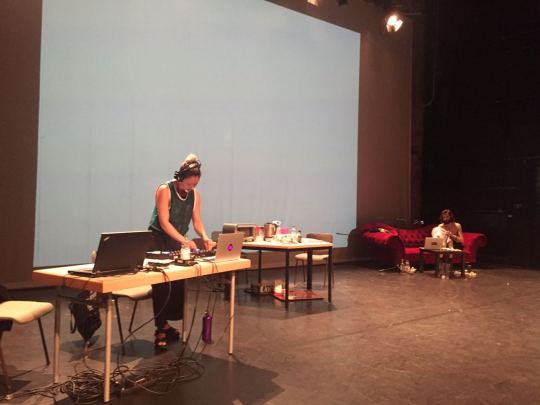
Maria Galindo, member of the feminist collective Mujeres Creando interviewed the Director of Museo Del Prado in Madrid with regards of the paintings of the bolivian baroque painter Melchior Perez de Holguín and the possibility of returning them to Bolivia. The answer was a categorical no, because for the director the paintings were legitimately purchased to which Maria pointed out that the money with which they paid was coming from the exploitation of el Cerro Rico, so from the same country. But the director of the Museo was again referring to the legality of the adqusition. The figure of what is legal is problematic, legality sadly, still nowadays lacks of true ethics, which brings me again to Gloria anzaldúa and her definition of conocimiento/knowledge, as something that is a experience that goes through the whole body and that implies consciousness which is something that no regular school, or university can teach.
The ancient memory of many communities Is locked in several european museums. If Europe dares to face decolonization, it has to return the objects taken to its places of origin. That’s one way of allowing peoples from all over the world their fair access to memory, and through memory the experience and the embodiment of different knowledges.
About four years ago, Illa Ekeko, a ritual object from the Tihuanacota culture finally returned to Bolivia. But again, the Museum of History of Bern stablished the agreement of returning the ritualistic object, saying what people that are the original owners what to do with it.
Memory is an access to knowledge. Knowledge is empowerment. Knowledge can is related to the embodiment of experiences : rituals, preparing of the ritual, gatherings. Exercising memory is something that is important for me in order to understand how I exist in this world. In order to expand my vision and to move forward I need to revisit places, to trace back my steps and my ancestors steps to have a wider notion of possibilities on the performance of myself, instead of allowing the system to chew me as a over spoken word, as a KFC nugget or to exist for it only as a consumer of everything and i mean everything because even spirituality is a huge business and ending up buying a ticket to a place that offers the mystical trip to the discovery of the self is so easy .
There’s no place that will allow me to find my self but the place inside myself, a place that requires self recognition, a non romanticized place that allows the remembrance and mourning about what has been lost and just then start to think what can be done to heal.
Daring to confront the blurry, messy places in the collective memory allows the first step of cleansing to happen. So the proposition is not to go back to a clean, pure place, but to acknowledge where we come from and how to make peace with the past in order to move forward.
Rituals are ways to enter into ancient knowledge, into places where science and spirituality are still mingled, where quantum physics have no need to be explained in formulas and the chemistry of tangible matter together with invisible matter such as thoughts or feelings intersect in a way that allows transformation to happen.
And here we are re interpreting the tradition of the T’antawawas, quechua word that means bread baby. During La fiesta de todos Santos, people bake Tantawawas to receive the souls of the departure ones. The portal in between the world of the death and the living is believed to be open between the 1st and the 2nd of November, so the souls can come to the world of the living and stay with their beloved ones for a day. A table full of Tantawawas and the favorite food and drinks of the departure one is awaiting them home. Then love works as a point of access to healing, and love is not the romantic or naiv, selfish love we’ve seen in hollywood movies. Let’s think of love as the only way out of patriarchy, colonialism, capitalism because love refuses to be silent, ignorant, so knowledge is an act of love, transformation and empowerment.
We want to invoke, to invite those who we cherish in our hearts, those who showed us the knowledge we needed, we wait here for them to share with us, we allow them a space not just for people and not just for people that departure. We call for the spirits that shaped us into what we are, places, mountains, rivers,animals, plants, languages. We await for something else to exist in this space.
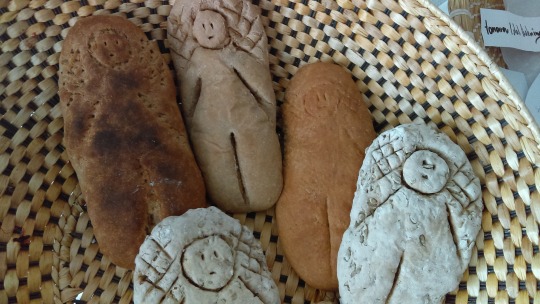
http://ednetwork.eu/2017/04/18/edn-conference-inventur-2-at-tanzhaus-nrw-dusseldorf-programme/
0 notes